Note
I enjoy your meta about Dazai not being entirely human, which is very possible because come on, it's a plot written by Asagiri Kafka. Everything can happen here. However, isn't Chuuya revealed to be a non-human (the ability itself), isn't being humans not an essential trait for controlling the ability?
Hi anon! I’m glad to hear that you enjoyed the theory on Dazai not being entirely human, but I didn’t write that — my good friend @samsa19 did :)
I’ll do my best to address your question regardless. Being human might not be an essential trait for controlling the ability, but I believe the main point is that Dazai’s ability is always active. Chuuya and Atsushi have a clear distinction between when their abilities turn on and off, but Dazai’s ability is technically always on, so that lends itself to the theory that he is a manifestation of his ability.
I’ll also add my two cents to this theory if you don’t mind. As you said, Dazai not being human is definitely possible because it’s BSD, anything can happen. It would definitely explain some strange things that Dazai has done (like controlling his heartbeat?!)
However, I personally like the idea of Dazai being human for the sake of his character arc. It’s more interesting to me to see Dazai as someone who is inherently human, but struggles with not feeling human. His development revolves around learning what humanity means, and how he can accept himself as a human being.
Taking soukoku into consideration, it would be nice to see Dazai parallel Chuuya in being non-human, but I personally prefer their currently established dynamic. Dazai is the actual human, who doesn’t feel human or express “human” emotions, but Chuuya is the non-human who exhibits more human behaviors than Dazai. Dazai struggles with accepting his humanity, Chuuya struggles with accepting his inhumanity, and I like the contrast between those ideas.
Of course, this is all just my perspective as an “analyst” of sorts. I’m not much of a theorizer myself, which is why I prefer to look at the story from this characterization stance. Despite all that, I still think Sam’s theory is well-supported and beautifully explained. Thank you for the ask!
73 notes
·
View notes
Text
Murakami and Ranpo
Some minor spoilers ahead for the third BSD LN, The Untold Story of the Founding of the Detective Agency." If you aren't concerned with spoilers, I did my best with summarizing the plot for anyone who hasn't read the novel.
In the third BSD LN, Fukuzawa and Ranpo are tasked with finding the culprit of an ominous death threat at a theatrical play. The threat is written as follows:
“An angel shall bring death, in the truest sense of the word, to the performer. —V.”
This threat fits perfectly with the play, which is a mystery play where each character gets killed by an "angel" who murders. However, the characters don't know if they're being killed by an angel or a regular person, because there's nothing supernatural about their causes of death (getting stabbed by a knife, poison, strangulation, etc.).
Each character was a former angel who had been banished from the celestial world, because they admired humans so much that God turned them into humans. Therefore, the characters in the play believed that an angel was sent after them to punish them for their sins.
This sets up two mysteries for us to follow:
1. The mystery of the real death threat, sent by "V" — who is the culprit behind it, who will they kill, and why?
2. The mystery within the play — is it an angel or real person killing each character, and why?
Paradoxes (and Things That Don't Make Sense)
The play is called, "The Living World is a Dream, the Nocturnal Dream is Reality," which is a quote from the real Edogawa Ranpo's work, but I couldn't find the exact source. The title proposes a paradox: reality is a dream, and dreams are reality.
Several other paradoxes present themselves in the story, but they appear most prominently in Ranpo's big speech where he solves the mystery of the play, and the murder simultaneously:
“The murder and the play’s story are connected on a deep level. This play reversed the tide of the narrative. A group of fallen angels tried to return to the heavens, but the angel of judgment tried to stop them. Meanwhile, the angel’s judgment was but a show, and the supposed victim, a human, faked it. The angel’s and humans’ roles were reversed, switching the judge and the judged. That’s the kind of play this was. "
"...the narrative is in reverse. Our structures have been swapped along with the victim and killer as well. In other words—he isn’t the killer, but a victim."
This reveal subverts the original expectation that the plot would follow two separate mysteries. Instead, the lines are blurred between reality and fiction, killer and killed, and dreams and reality because now the two mysteries are intertwined.
I think this part of the story is deliberately written to be confusing (or at least not very clearly explained) as to fit in with the themes found in Murakami's writing.
Who is Murakami?
Haruki Murakami is a famous Japanese author, and you may have read some of his famous works, "Norwegian Wood" and "Kafka on the Shore."
Since this is Bungou (Literary) Stray Dogs, Murakami makes an appearance in this light novel as the main actor of the play.
Before I go on to explain Murakami's role in the novel, I'll give a brief background on his real counterpart and explain how the theatrical play in the novel reflects the real Murakami's work.
Murakami writes in the genre of "magical realism", where the lines between fantasy and reality are blurred as magical elements are seamlessly incorporated into the story. I'll be using "Kafka on the Shore" as the main example for this point, since it's a great example of Murakami's expertise in magical realism.
In "Kafka on the Shore," there are 2 interrelated plot lines, alternating with each chapter, similar to the 2 supposed mysteries outlined at the beginning of the novel.
Like its moniker, "Kafka on the Shore" resembles a "Kafkaesque" style of writing due to its surreal elements that are bizarre and illogical in the rules of reality.
In an interview about this novel, Murakami said:
"Kafka on the Shore contains several riddles, but there aren't any solutions provided. Instead, several of these riddles combine, and through their interaction the possibility of a solution takes shape. And the form this solution takes will be different for each reader. To put it another way, the riddles function as part of the solution. It's hard to explain, but that's the kind of novel I set out to write."
The Outcome of the Play
In theme with Murakami's bizarre, magical-realism writings, several illogical events take place within the span of the LN:
1. Before the play even starts, Murakami (the character) and the rest of the cast completely disregard the death threat. Even though the logical and safe solution would be to reschedule the play, it is a very literal representation of "the play must go on" mindset.
2. Murakami gets stabbed mid-sentence, on stage by a white blade that magically disappears.
3. Murakami bleeds real blood and has no pulse, which would signify his death, but he doesn't actually die.
Despite all this, Ranpo is extremely good at observing various elements of a situation and putting them together to form a solution, much like how the interactions of "Kafka on the Shore"'s riddles form their own solution.
Ranpo appears on stage and makes an Oscar-worthy performance out of his announcement that reveals Murakami to be the culprit behind his own death. It doesn't make much logical sense that Murakami would fake his own death for a performance, but rather it's an action motivated by pure passion.
“I…,” muttered Murakami in almost a whisper. He raised his voice and continued, “I am an actor! I become someone I am not and live a life that doesn’t exist! My job is to expose what it means to be human! It doesn’t matter if I play the lead part or a minor part. It doesn’t matter if I am a villain or hero. I become them with every part of my body! There is no other job for me! This is the only way I can live!”
And here, Murakami reveals the final paradox of the play:
"But there is one thing that cannot be avoided while acting on the stage of life, and that is death! Death is not the opposite of life; it is life’s symbol and banner. However, it also provides a great paradox! Nobody alive has ever experienced it! That’s why to me, the greatest job of all would be performing the death of a person. Not death as a device or a mere convention, but real death that I could convey to the audience. That was the pinnacle of theatrical performance to me. And this is the outcome of my toil."
Murakami eventually gets arrested for the fake death threat and deceiving the police, among other things. The most notable moment after this comes in Ranpo's dialogue to Murakami:
“I thought you were amazing,” Ranpo suddenly said from behind as Murakami was being taken away. “I didn’t quite understand all of it myself, but I don’t think it’s something that just anyone could do. By the way, take a look at the audience. Look at their faces.”
1. Ranpo sees Murakami's act as something admirable, most likely because Ranpo appreciates a good mystery and had fun solving it.
2. Ranpo tells Murakami to look at the audience, to which he turns around and sees the faces of a broken audience who came to watch a play and instead witnessed a real not-so-real murder.
“You said your job was entertainment, right? But could you really call it that…when you look at their expressions?” For the first time, Murakami’s eyes showed a sign of weakness. “…I see.” A small voice, unlike what one would expect from a stage actor with a powerful voice, fell from the stage. “I was…only performing for myself.”
Murakami realizes that he traumatized his entire audience on his quest to reach the "pinnacle of theatrical performance." In his small world that consisted of just the stage, he failed to see the outside world and forgot to consider how his actions would impact others. It's also important to mention that it was Ranpo specifically who pointed it out to him.
The focus on the audience mirrors Fukuzawa's thoughts when Ranpo was giving his big speech before Murakami appeared on the stage:
Fukuzawa was at his wits’ end. From the playgoers’ point of view, the fact that people knew there was going to be a murder beforehand completely changed their view of the situation. Was it really okay to tell them that? But Ranpo showed no concern for the audience’s worries.
Ranpo, throughout the entire novel, is portrayed as this extraordinarily ordinary kid who means well but simply doesn't understand what others are thinking. He was taught that he wasn't special, but this only isolated him into his own tiny world, because the outside world was filled with things he didn't understand.
This leads to him upsetting a bunch of people by blatantly calling out things about them that shouldn't be called out, like the theater's owner Ms. Egawa, and even Fukuzawa at one point.
However, this moment when he calls out Murakami is pivotal because it shows how he's grown from this event. He's learned to be considerate of others. He's seen how he can upset other people with the things he says, and he's learned from that enough to show another person who's trapped in their own individual world.
Although Ranpo is depicted to be somewhat self-centered throughout this novel and even after it, Fukuzawa taught him that he isn't alone in this world. Because Fukuzawa showed compassion to Ranpo, a special fifteen-year-old kid who didn't know better in a world of monsters, Ranpo learned how to exist in a world where he was different from everyone else, and that was okay.
Thank you for reading! If you haven't read this LN yet, I would still highly recommend it because I didn't cover the entirety of the mystery, and it's a wonderful read to understand more about Ranpo and Fukuzawa's backstory.
#bsd#bsd meta#bsd analysis#bsd ranpo#murakami#bsd light novel#i actually read the LN a while ago#but didn't realize murakami was in it until i finished kafka on the shore
167 notes
·
View notes
Text
theory: dazai is not completely human
In Chapter 1 of the Stormbringer novel, there’s this intriguing passage.
Quoting my own shitty interpretation, it reads:
“Abilities, of course, can’t be controlled by machines. Only human souls can seize them. However, simultaneously, it means that the limitations of abilities are defined by the soul…the ability thinks ‘there is a human’, and hence, grows under control [of the human].”
Now, this is interesting because 1) it means that abilities are canonically sentient, and 2) it associates with the souls of humans.
Adding into consideration the plot of Dead Apple, it’s apparent that the human’s soul must be stronger than the ability itself. This enforces the symbiotic relationship between the user and the ability- the user allows the ability to manifest, and in exchange, the ability enhances the parameters of the capabilities of the user.
But what if the ability and the soul, are not in this relationship?
Here I want to introduce an official artwork by Harukawa35-sensei. It’s apparently on one of the DVD sets sold a few years ago:
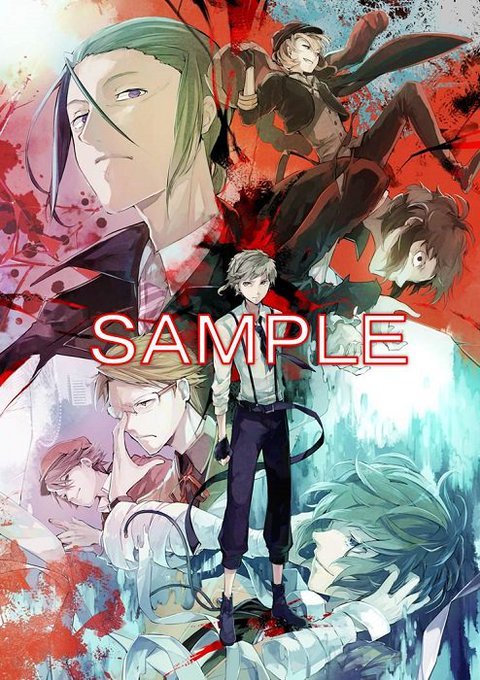
And at the bottom you’ll notice:
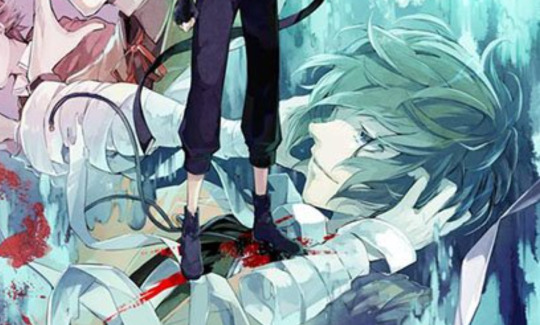
That Dazai’s bandages unravel– to what? To nothing.
This could easily be a piece of imagery. But I think it’s too bold to mean anything abstract.
Because this scene exists:
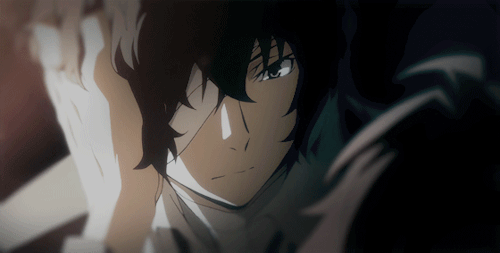
(I’ll explain more about the relevance of this later.)
It’s openly revealed that No Longer Human is constantly active. Based on what we’ve seen from others, we also know that they can cause changes on the direct physical form of the user.
This alone can be made into a simple conclusion- that No Longer Human is inflicting solid effect on Dazai’s form, which is transparency of this flesh. And it can just end there.
However.
Let’s bring up, say, Atsushi’s tiger. Or Chuuya’s Corruption. The commonality with these two is that both are, although demonstrating visible effect on the flesh of the users, they are, in some way, under control. They take some time and some specific circumstances, but they are indeed manageable. And this management allows the user to return to their unmodified human form.
Taking this, it would mean that Dazai’s soul is not completely controlling his ability.
What exactly would this look like?
No Longer Human isn’t exactly out of control. Because if it can, it hasn’t gone wild. But it’s not in control, either, because it always exists on the user’s (Dazai’s) body. Meaning, the human we see as Dazai compiles both his original human soul, and also the direct entity of his ability.
I said before that I’ll explain the relevance of the Odasaku scene.
Let’s say that the space under the bandages was transparency. Transparency, taken up by the manifestation of the ability.
If the hypothesis that Dazai is made both of soul and ability is true, this means that Dazai’s soul is dependent on his ability, and his ability is dependent on his soul. The more Dazai stayed in the Port Mafia, the more he was consumed by the darkness that was despair. If Dazai’s soul was healed by Odasaku’s dying wishes, it means that, the moment he said so, he was given a meaning to life- his soul was partially healed, and needed less dependence. And thus, the bandages revealed following this scene unraveled a complete and intact face.
So I could just stop here. But there’s more.
Because there’s another possibility I’m thinking about. (Though it won’t be very well-received, from what I gather.)
I think the best way to start it is to analyze what the existence of No Longer Human means.
By definition, No Longer Human is a non-exceptional nullifier. It deactivates every ability it touches.
The theory I’m about to propose builds on the guess that No Longer Human is a living paradox. If it expels everything that is an “ability”, that can’t exclude itself. Because its existence itself is indeed an ability.
Theoretically. What would this lead to? Or in other words- what specific behavior would this manifest as?
Of course, self-destruction.
I stated earlier that Dazai’s soul and ability depend on each other. They’re reliant. They’re connected.
So yes- I will say, that Dazai’s ability inflicts self-destruction on its user.
Not just in the form of physical transparency, like it seems to be doing under his bandages.
But also; suicide.
So here, I wondered.
What if Dazai himself indeed wasn’t human?
In which case- the ability will have overwhelmed the human soul. Following its occupation of the spirit and flesh of a human, it will have consumed the user; until the remnants of the original human are reduced to such little humanity, that all that’s left is the growing self-destruction of the ability.
Sticking out on a limb, I say that the possible placement of Tsujima Shuuji as the “original human” would make sense.
And the new, ability-consumed soul?
Dazai Osamu.
thank you for reading my bullshit theory till the end bye now have a wonderful day
#bsd#bsd theory#i am not much of a theorizer myself#so tbh i don’t have many thoughts on this#but it was fun to read#i remember you told me abt this a while ago nice to see it in a fleshed out post
861 notes
·
View notes
Text
Chuuya's absence in Dark Era is definitely strange, but I do have a few reasons in mind for why he isn't in the novel.
1. The Dark Era LN serves to develop Dazai's character by revealing the layers of his backstory, so the audience has a better understanding of why he acts the way he does in the main timeline. I wouldn't want to expand on this too much here, but Ango and Oda specifically provide a perspective on life that differs a lot from how Dazai in his mafia days perceived life. Chuuya is also valuable in this sense, being a foil to Dazai during the main series, but I believe Asagiri wanted to go with this specific approach with the Buraiha trio.
Akutagawa also may have been mentioned because the way Dazai treats Akutagawa reveals a lot about his view on life and overall attitude as an executive.
(Of course, Oda, Ango, and Akutagawa serve many purposes as their own unique characters, but specifically during Dark Era they have a significant impact on how Dazai acts).
2. A much simpler reason: the light novel was released on August 1st, 2014 in Japan, when the manga was still in its relatively early stages (volume 5, in the middle of the Guild Arc). Although Chuuya had been already introduced as Dazai's partner, I'd assume that Asagiri had been writing the novel for a while before his introduction, and it may just be an oversight in combination with the reason above.
3. Stories tend to change over time, and it's not the only time that BSD has done some strange things in the timeline that may not necessarily add up over time (like in Dead Apple). As you mentioned, Chuuya becoming such a popular character probably influenced Asagiri to give him greater plot relevance, but that popularity didn't exist when the LN was released.
Take my thoughts with a grain of salt; I'm not Asagiri so I have no idea what he's thinking, but I do trust greatly in his writing ability so I don't see Chuuya's absence as a big flaw in Dark Era (although it does bother me a teensy bit).
One thing that still baffles me to this day is just how non-existent Chuuya is in the dark era story. And it's not even like I would expect him to have a huge role, as much as I love him dark era isn't his story and that's fine.
But he is literally not even mentioned once in the whole fucking novel. Considering all we know, he should be there. He is an executive and Dazai's partner it seems so weird that he wouldn't be involved in the conflict with mimic at all. And there are a lot of possible reasons why he could be out of the picture but we never even get a passing comment about his whereabouts. Even Akutagawa is mentioned.
It's just - that's a decision. Somewhere along the line despite the relationships and timelines it was decided that Chuuya would not be mentioned in Dark Era and I don't unterstand why. Like I said, it would be a completely different story if he was just "written out", like it's mentioned in passing he has his hands full with other stuff or that he's overseas or something along the lines and then he is never mentioned again. But we don't even get that.
I thought that maybe Asagiri just forgot about him when writing Dark Era. But in my mind that's unlikely and there's two main arguments as for why: 1. Chuuya is a super popular character. If Asagiri just forgot about him I would actually expect the production to add some throwaway line about him in the anime adaptation to make up for that. And 2. I somehow can't see Asagiri just forgetting about him. He wrote two whole novels centering his character and his relationship with Dazai. Even if they came after Dark Era, that makes it hard to imagine he would just forget him. (Plus 3. Even if it's minor, he has acknowledged in the afterword to stormbringer that we still don't know Chuuya's feelings on Dazai leaving, so he is aware of the hole in Chuuya's story there)
And the only possible explanation I can think of is that it would be a spoiler for later story parts of bsd. That there is a reason he isn't there but revealing what would for some reason spoil a later development. But somehow that also doesn't add up because what could that possibly be? I don't know, I can't get over this because this decision just confuses me so fucking much. Please, if anyone has theories or insights, share them with me!
#bsd#i am sorry if this is a long convoluted response that did not answer your question#i really hope chuuya will come back soon
186 notes
·
View notes
Note
I'm really not sure what I'm saying, but isn't suicide frowned upon in Japanese culture? I think I heard a cultural program that said something like that. If that's true, then why would the real Dazai Osamu be so popular as a person as well as a poet? Sorry if this is asked awkwardly.
Thank you for the ask! (not awkward at all, don’t worry) I did some research into this — since I’m not Japanese, I don’t have the same understanding of the culture as a native person would — but I’ll do my best to answer your question regardless.
Although I wouldn’t go as far as to say suicide is encouraged in Japanese culture, it is somewhat tolerated (definitely not frowned upon). Japanese culture places a heavy emphasis on being accepted by the community, so alienation from others may contribute to feelings of low self-worth. ”No Longer Human”, Dazai’s most popular work outside of Japan, portrays these exact emotions pretty strongly.
Dazai Osamu was most popular in the post-war period following WWII with his work, “The Setting Sun”. This era of Japanese literature was characterized by the loss of purpose people experienced after the Japanese’s defeat in WWII, which is essentially what “The Setting Sun” revolves around.
From reading his works, I’d assume that people felt a close connection to Dazai, or at least strongly resonated with his feelings, which led to the rise in his popularity both as a person and as an author of incredible work. Dazai particularly excels in writing raw emotions that really encapsulate the feeling of post-war depression, so it makes sense that his works are now seen as Japanese classics.
Hopefully I answered your question! Have a great day anon, and thank you for the ask once again :)
26 notes
·
View notes
Text
ok so we’re running with the philosophy of crime and punishment here about the “ordinary man” v. the “extraordinary man.” essentially, in the novel, raskolnikov breaks down the world into two groups of people. firstly, there are the “ordinary” people, who don’t have the ability to break the mold and create a world according to their own morals/philosophies/beliefs. they’re the direct opposite of “extraordinary” people, who have both the ability to think outside of the box and to break the mold, regardless of the human cost/sacrifice, therefore putting their own ideas into place and “paving the way” for a brighter future.
crucially, raskolnikov makes it clear that there are occasions where the “ordinary man,” believing themselves to be “extraordinary,” will take lives and commit moral injustices for the sake of pushing their own narrow-minded beliefs – before being haunted by the guilt of their actions, eventually finding it necessary to confess, repent, and strive for redemption.
even more crucially, by the end of the novel, raskolnikov himself has watched his own theory crumble to the ground as he realizes that he was one of these “pretenders” – and that, in reality, there are no “extraordinary men.” he finds that morality is innate within a person, and repentance/redemption are inevitabilities once one has wronged others or their own innate sense of morality. to pretend that one is not human is to put yourself in a position higher than god himself.
what i’m getting at is that nikolai is the trope of the “ordinary man” and fyodor is the trope of the “extraordinary man” and both of them can and will be redeemed, which would absolutely fit into the existing themes of bsd as a whole. let’s get it boys
Keep reading
155 notes
·
View notes
Text
thank you for the tags @boredotaku567 and @samsa19 ~!
five songs I listen to a lot:
1. cupid’s chokehold / breakfast in america - gym class heroes
2. love, or the lack thereof - isaac dunbar
3. talk me down - troye sivan
4. control me - colde
5. welcome to the end of your life - the driver era
last movie: maquia (when the promised flower blooms)
currently watching: jjk, aot s4, bsd wan, horimiya, sk8, tpn s2
currently reading: kafka on the shore (murakami), bsd (manga and stormbringer), aot, jjk
feel free to reblog if anyone else wants to do this :)
Tagged by @lady-of-the-lotus
Five songs I’ve been listening to a lot:
1. If I killed someone for you - Alec Benjamin
2. Sweet boi - Chevy
3. Close as strangers - 5sos
4. Heartbreak girl - 5sos
5. Drivers license - Olivia Rodrigo
Last movie: Black panther (I think)
Currently watching: My hero academia
Currently reading: Just a bunch of fanfiction
@sugarsymphonyy @elektrosonix and anyone else who sees this and wants to do it!
200 notes
·
View notes
Text
since sam asked so politely here is mine ~
i don’t usually do these because i’m a pretty plain person but i like looking through everyone else’s
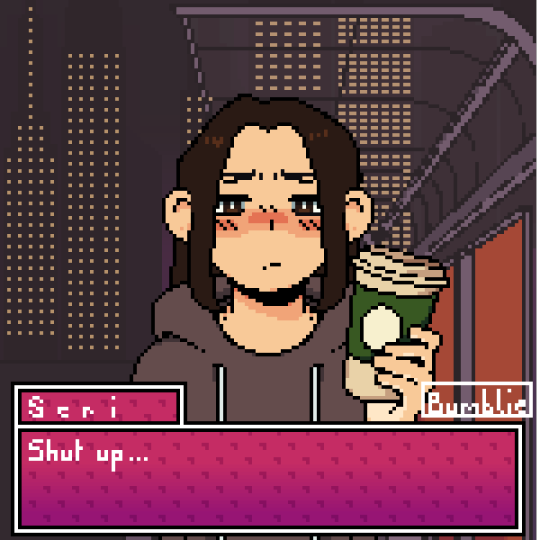
thank you for tagging me @boredotaku567 and @samsa19 of course :)
anyone who wants to do this too feel free to reblog!
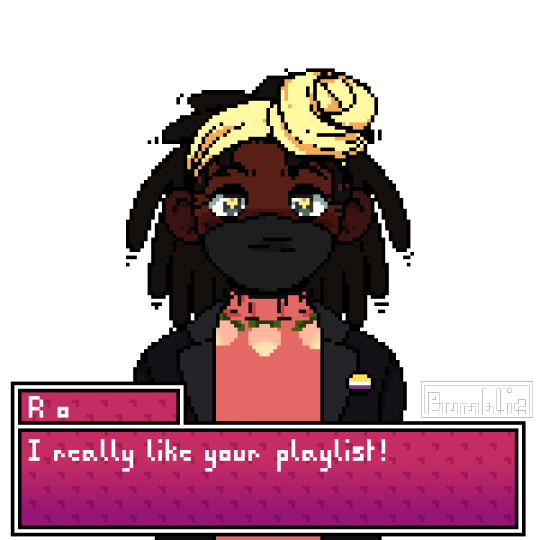
586 notes
·
View notes
Text
Who is writing Gogol's Book?
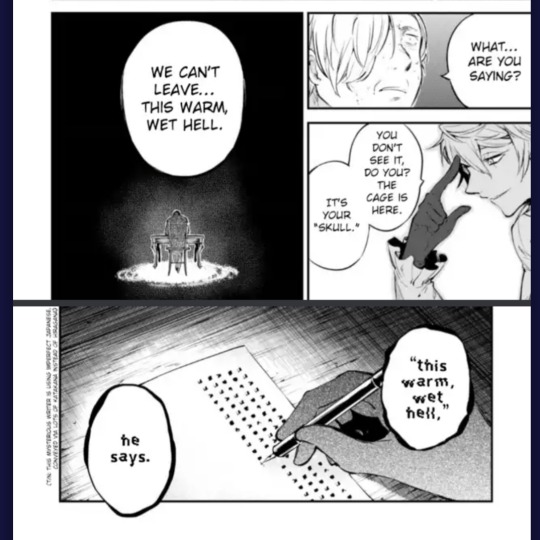
Okay, a lot of people talked about Gogol and the philosophy he exposes in his introductory chapter, but how comes that I've found nobody talking about this?!
I mean ... it's an huge middle finger to his ideals, right as he exposes them. Here he is, talking about free will and feelings of being in a cage, and here is someone else who is literally writing down the things he gets to say. His character profile lists brainwashing and subordination as his dislikes, and here, his final act of free will is in subordination to what another dictates.
Now, this begs the question: who the hell is the shadowy figure?
Well, I've got two theories on that:
• Fyodor
• Kafka Asagiri
I'll focus on the second theory first, because it's non shippy very very meta. In this sense, Gogol never had one ounce of free will: he's literally a character, created by an author for a manga. Everything, his looks, his personality, his actions and words are decided by someone else of whom he has no awareness. Characters in stories are the epythome of determinism. With the whole series being based on reflections around writers and their stories, this would be rather fitting, even if a bit of a non-sequitur.
Now, on to the juicy theory! Which has also strong support from canon. First of all, as our great translators (dazaiscans) point out, this writer is using an imperfect japanese, conveyed via katakana, a form generally used to indicate foreign words.

Fyodor is a foreigner and, if the omakes are to be considered canon, still learning Japanese.
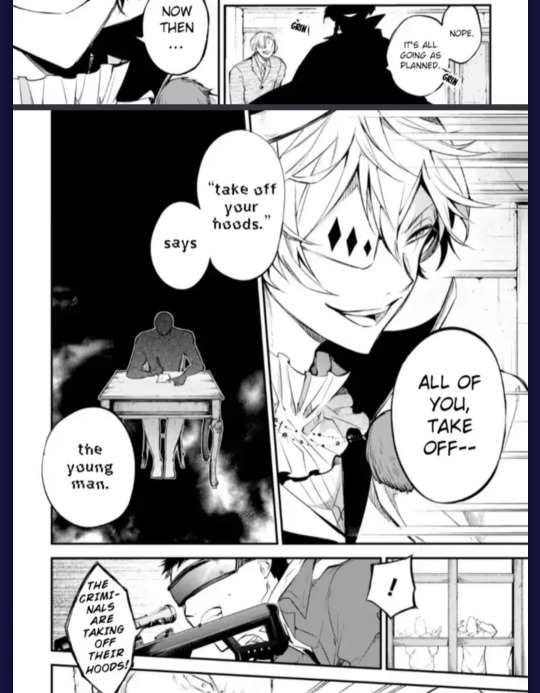

Moreover, this scenes seem to indicate that this is the writing of the famous page which brought countless pains to the Armed Detective Agency, the moment in which the previously unnamed assistants of Gogol remove their hoods and suddenly our heroes find themselves in their position, despite having been outside trying to stop the massacre until a moment before.
And we have confirmation that it was Fyodor who wrote that page. So, all the hints are towards the Shadowy Figure being him.
But we have also been told that only a few lines can fit on the lone Page; so why 'waste' some of them to write Gogol's exact speech? And if that was written by Fyodor, what else did he write?
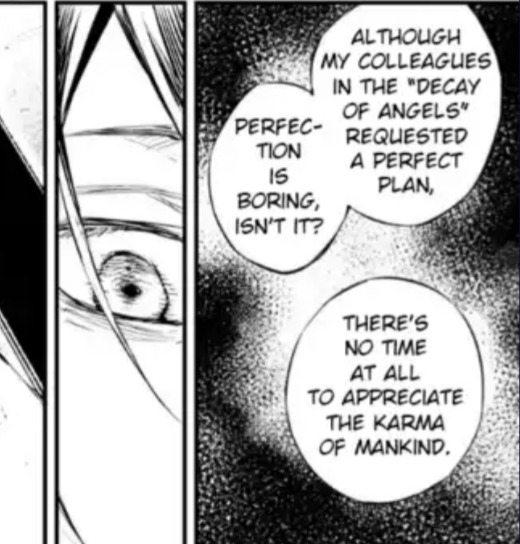
Well ... he himself said that he didn't create the perfect plan his colleagues required, because that would have been boring. But he's thinking that after activating his plan to assassinate Fitzgerald - which was foiled by Dazai, but it was supposed to work, as Fyodor is actually surprised to see Dazai there and probably didn't expect his intervention. So ... where does the 'imperfect plan' come in?
First of all, there is the line he added about 'all police forces will not believe the ADA's innocence', which is foiled by Tachihara playing both sides ... and there is a very distinct possibility that Fyodor knew this would have happened, as he was aware of the identity of the Fifth Hunting Dog (he taunted Dazai with it). I have already theorized that this was a way to undermine Fukuchi's plan to get him out of the way and become the one to put his hands on the Book; but maybe this wasn't the only flaw he put in the plan?
And he was taking a great care in writing Gogol's death. According to Sigma, in the original plan he was supposed to truly die, to erase any evidence of the true culprit from the scene. But Gogol survived, appearently due to a sudden idea of him ... but well, isn't it strange that someone like Fyodor, so good at foreseeing other people's actions, didn't think of it and put a failsafe in the page he was redacting?
Is it possible that Gogol's escape was put on the page, or that the writing on it stopped conveniently at some point that would allow the clown an escape?
But if this is the case, why would he have done this?
Ship.
Hah, I (and every Fyogol shipper with me) wish! But alas, knowing the characters, it was probably something other than pure care for the other. Personally, I suspect that Gogol is supposed to be his own method of escaping jail. Of course, insofar it has been a safe refuge, but he's got to get out sooner or later if he wants to use the Book. And he thought that Gogol, who has a teleportation Ability, would be the right person for that. As for 'why does he think Gogol would do that' ... I don't know. Maybe he has an inkling about the clown's feelings of murderous friendship towards him, but thinks he can take him on with his Ability?
Of course, this is the purely logical way to look at this possibility - the one that, should this theory be proven correct, will likely held true ... but I still have a tiny bit of hope that, maybe subconsciously, part of the reason Fyodor let Gogol live was that he cared about him.
Still, given how much he hates brainwashing and subordination, I really don't think Gogol would appreciate that if he were to find out - especially from 'the only one who understands him'.
Anyways, this insofar is only in the realm of speculation. The only thing certain about what Fyodor did with that page, is that he doodled on it (those who have seen his real life conterpart's manuscripts know).
Thanks to anyone who bothered to read my ramblings!
160 notes
·
View notes
Note
SAMMM i’m actually speechless TTTT
they give me too much credit, our translations are equal parts effort from both of us of course
not to mention the fact that translating is an unimaginably difficult task already !! (for my typesetter brain at least)
i’m so so so grateful to have sam as a translator , especially since i just randomly showed up in their inbox one day and said “lemme typeset for you :)”
i’d also like to shout out @boredotaku567 for sending me the beautiful person award as well <33 thank you for the kind message!
i’m also incredibly grateful for every person who takes the time out of their day to read my posts or leave a comment, it truly means a lot to me!
thank you everyone (especially sam psst psst go follow them) for being beautiful people <3
BEAUTIFUL PERSON AWARD! Once you are given this award you're supposed to paste it in the asks of 8 people who deserve it. If you break the chain nothing happens, but it's sweet to know someone think you're beautiful inside and out!
Along with amazing theorist, translator and wonderful person Award ❤❤❤❤❤❤❤❤❤❤❤❤❤❤❤❤❤❤❤❤❤❤❤❤
AWW THANK YOU SO MUCH~!!!!
Instead of putting it in their ask, I think I’ll list them here. They’re all beautiful people worthy of all the love. so check them out, follow them, shower them with notes because I promise they are all super worthy and deserving~~~
@boredotaku567 because. should I ever need to explain. you even gave us the award twiceee (you’re always so nice as well!)
@cocoa-sssscraps and @cocoa-art they live up to their name they are so so so so so sweet. Like honestly they’re just a really radiating-positive-energy person. They have amazing art too~!
@ellie-rosewood because they give me amazing theory food. And generally they seem like a really nice person :)
@masked-buffoon (pretty sure they were the other anon at buraiha ahahah) they leave little notes for me and seri-san which are both so sweet and so kind of them :) they write too, check them out!
@jzjamin I’ve talked to them only a few times but they’re really nice!! when I log on in the afternoon it’s nice seeing their 20-something reblogs on my feed (I swear it really does make me smile)
And I ran out of people to put above so.
@caffeinatedseri . ohhh where do I start.
Okay. so. as part of @buraihatranslations I think I should clarify something. and that is, they literally carry. everything. every screw-up, hiatus, mistype I have ever had, they brush off with a “no problem” and fix everything. I do not deserve this person. and this person deserves a better translator. to be honest I don’t know why she works with me. in my opinion, such a kind and earnest, punctual individual, deserves a person equally the same.
I think people like them make the non-toxic, safe BSD fandom what it is. like. I don’t have enough thanks to tell them.
so seri-san, given the opportunity, thank you. so much. everyone, go follow them. (they have awesome theories too)
(Bored-otaku-san I hope you’re not regretting giving me this ask ahahahah)
But thank you. You made my day :) have a beautiful day wherever you are!
8 notes
·
View notes
Text
Why Dazai Slapped Atsushi
The infamous scene in which Dazai slaps Atsushi after battling with Q is personally one of my favorite scenes in the entirety of BSD.
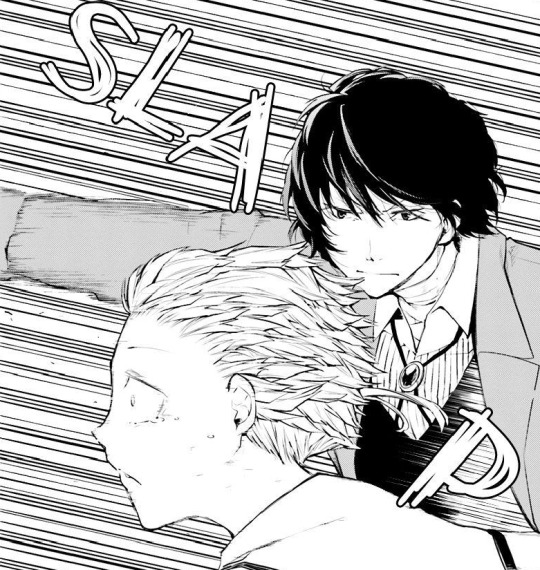
I’ve definitely seen some takes that criticize this scene for completely valid reasons (it’s kind of a cliché to “slap” someone out of their mindset, Dazai’s behavior is unjustified, etc.)
However, I still think this scene represents an important point in Atsushi and Dazai’s respective character development, as well as their budding mentor-student relationship.
Atsushi
Let’s rewind to before the slap took place.
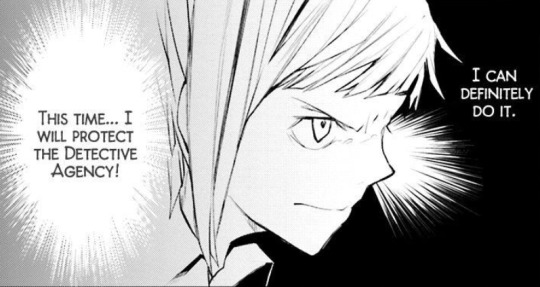
Atsushi truly believes in his ability to protect the agency, a moment of confidence that shows how much he’s grown from the beginning of the story.
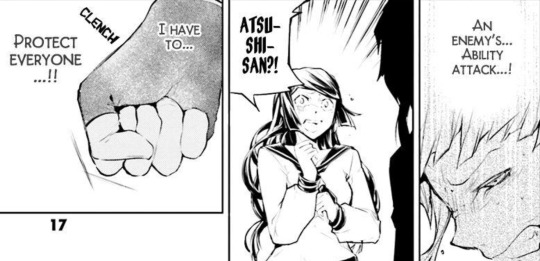
Even when he’s under the influence of Q, his ideal to “protect everyone” remains.
This constant repetition of the need to protect others emphasizes how strongly rooted this ideal is implanted in Atsushi’s mind. It also sets up how Atsushi places immense pressure on himself in order to carry out that ideal.
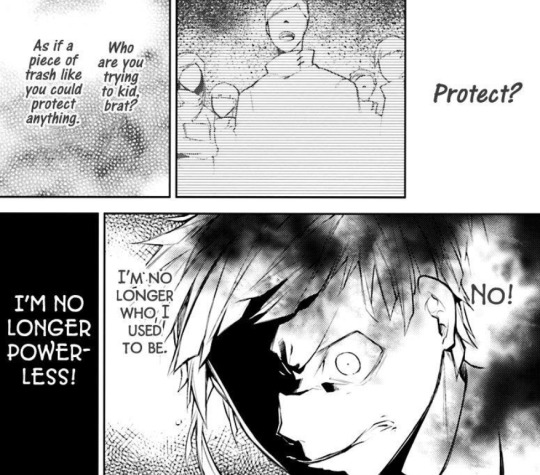
As a testament to his growth, when faced with the intrusive thoughts of the Headmaster, he still pushes onwards by accepting the power he has and using it for good. Take note of his choice of words here: “I’m no longer who I used to be. I’m not longer powerless!”
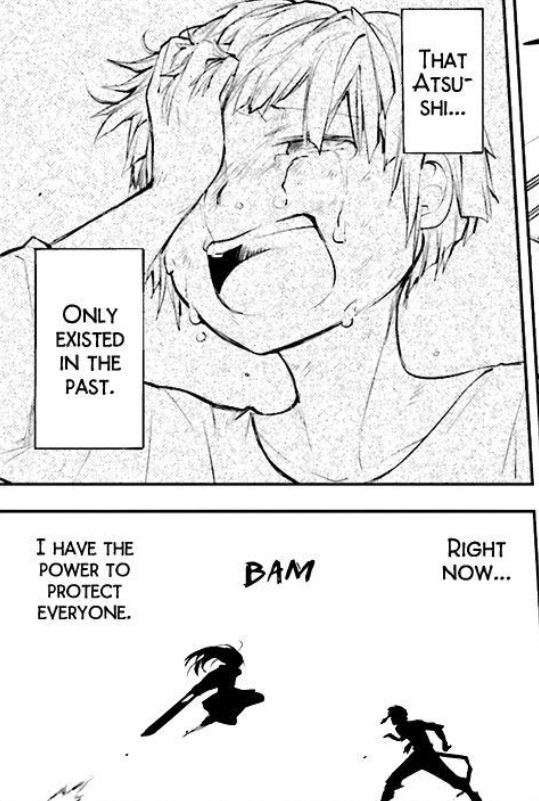
Atsushi separates his past self and future self in diametrically opposed ways. His past self is a crying child, powerless to save himself and others (or ”a piece of trash,” as he says). His future self is confident, heroic, and has the necessary power to save others.
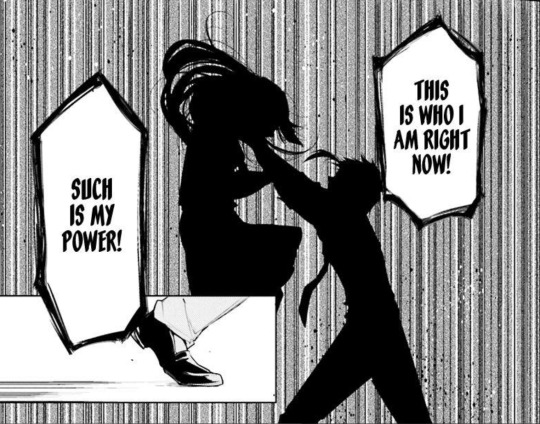
This panel is intentionally framed in an ominous way that changes once you learn that Atsushi was the one being controlled by Q.
At first, Atsushi uses his power to save others, upholding his ideal and proving to himself that he’s different from his past self.
In actuality, it’s Atsushi hurting the person he was supposed to protect, with the very strength that he was supposed to protect them with (thus the menacing silhouette).
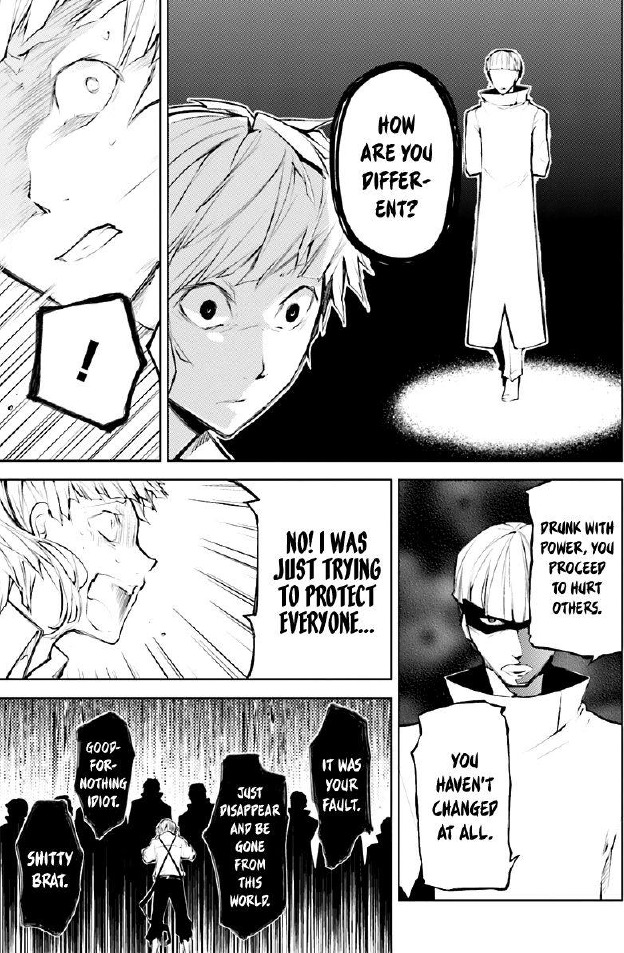
Atsushi’s mind immediately becomes scrambled once he learns that it was his fault that Naomi and Haruno got injured. The intrusive thoughts of the Headmaster come back, and his prior confidence is crushed.
There’s two important ideas repeated in this oppressive mindset:
1. He hasn’t changed at all.
2. It was his responsibility to protect them and he didn’t do so.
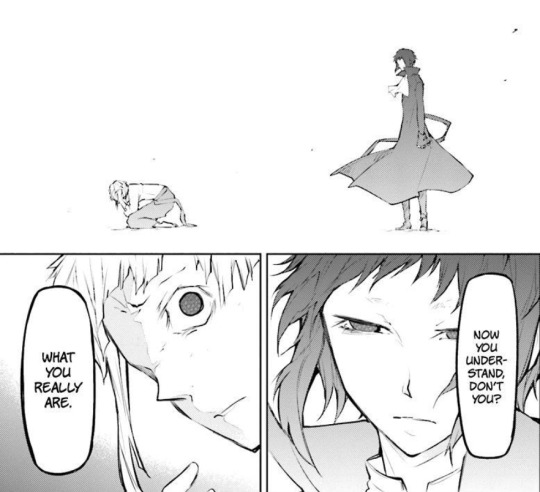
Atsushi even sees Akutagawa (his rival, most hated person ever) in his thoughts. In BSD, the way eyes are colored carries a lot of significance towards each character and their “chance at redemption”.
In this particular scene, Atsushi’s eyes are completed colored in, as well as Akutagawa’s, to represent how Atsushi is as irredeemable as Akutagawa is, in this realm of his mind. Atsushi has gone back to square one, viewing himself as worthless, beyond redemption, and undeserving of life.
And then... Dazai slaps him, and says this:
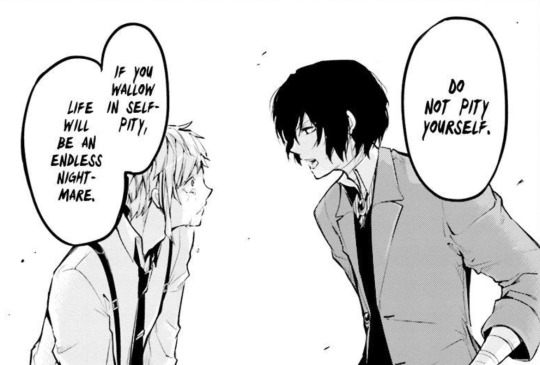
You can interpret what Dazai says as insensitive or harsh, since Atsushi is clearly going through a rough time, but I think Dazai gave Atsushi some much needed advice.
It’s important to understand what Dazai’s really saying here. In brief, I interpreted it as a wake-up call to Atsushi — in order to continue living, Atsushi has to stop “pitying” himself, or shaming himself for not doing the right thing.
Atsushi has clearly shown growth from the beginning of the series, and he very well knows that. He did his best to protect Naomi and Haruno, and they hold no grudges against Atsushi for literally being manipulated out of his free will. Therefore, Atsushi has no reason to blame himself for what happened.
It’s definitely not as easy as it sounds to simply rid himself of these oppressive thoughts, but it’s an important message to hear from Dazai, his mentor and the man he looks up to a lot (for some reason).
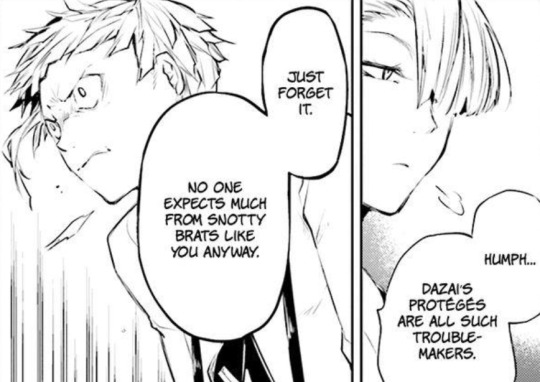
In the following chapter, Kouyou says, “No one expects much from snotty brats like you anyways,” after a brief flashback to when Atsushi accidentally hurt Haruno.
Despite the fact that Kouyou is technically an enemy, she brings up a very important point: No one is expecting anything miraculous from Atsushi.
Atsushi desperately tries to separate his current self from his past, but that doesn’t erase the past — erasing the past is impossible.
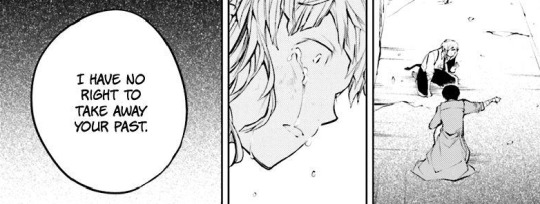
Even Dazai acknowledges this; Atsushi is capable from growing from his past self of course, but the separation of identity that Atsushi forces on himself is unreasonable.
Atsushi is still young, he still has those parts of a crying child and a “snotty brat” in him. He doesn’t need to be brave or heroic, he doesn’t need to save anyone to redeem himself.
Dazai’s advice to Atsushi counters the two foundational ideas of Atsushi’s oppressive mindset, and brings light to these points:
1. Atsushi has changed, for the better, and he knows it. This moment of weakness doesn’t change the fact that he’s grown from his past, and there’s no need to dwell on it.
2. Atsushi was placing an unreasonable burden on himself to protect everyone. Success is never guaranteed, especially when fighting against a mind controlling ability user, so he shouldn’t blame himself for not protecting them.
Dazai
I won’t justify Dazai slapping Atsushi, because it was still unnecessary despite everything I’ve already written.
However, this is also a pretty pivotal point in Dazai’s development as well.

We get to see this moment of vulnerability in Dazai’s eyes. I have no doubts that Dazai genuinely cares for Atsushi, so this can be interpreted as a moment in which Dazai wants to comfort Atsushi.
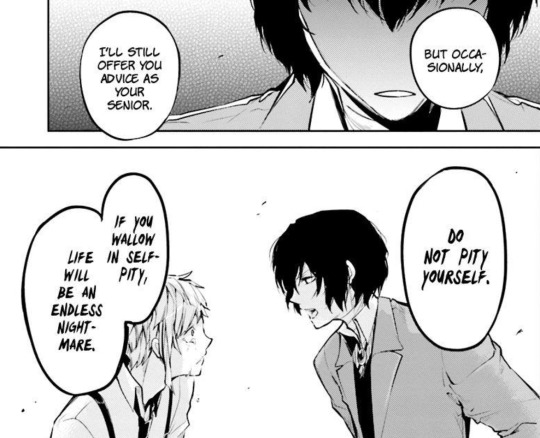
However, the very next panel shows Dazai’s eyes hidden away, before they return to their usual darkness as Dazai says the famous quote.
Although Dazai wanted to comfort Atsushi, he decided to give cold, hard, unadulterated advice instead because he saw that as the best solution to Atsushi’s problem (whether or not it actually was the best solution is debatable).
This reveals a little bit of Dazai’s heart — he’s capable of compassion, but he doesn’t choose to show it.
This moment also starts the progression of Dazai acting as a more proper “mentor figure” to Atsushi. Later on, we have the Portrait of a Father chapter when Dazai gives Atsushi necessary advice once more, and of course the many missions in which Dazai trusts Atsushi to accomplish a lot of things (saving Moby Dick, finding Fyodor, etc.)
Although you could see that as Dazai overburdening Atsushi with responsibility (the very thing we were trying to avoid), it feels more like Dazai knows that Atsushi is capable of doing whatever he asks, and Dazai trusts him to do so. That sense of trust isn’t lost on Atsushi, which motivates him to do even better with the comfort of knowing that he is capable of protecting others.
292 notes
·
View notes
Photo
please enjoy! this was a very intense chapter :0
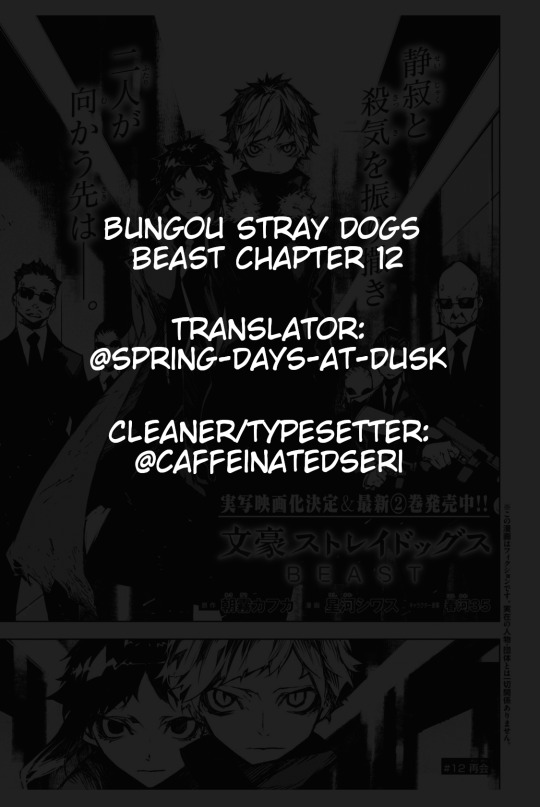
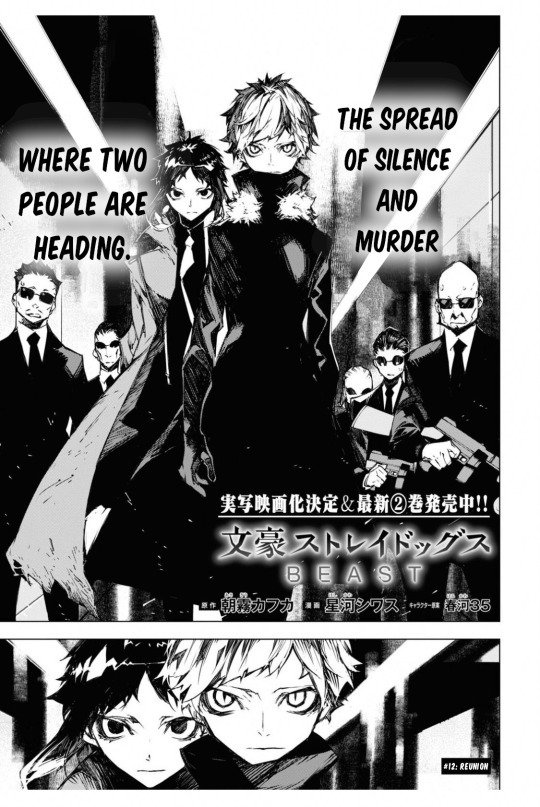
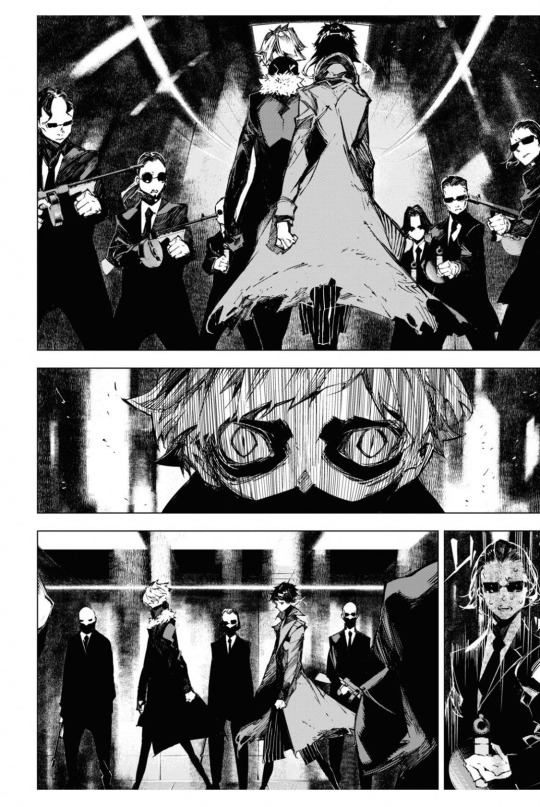
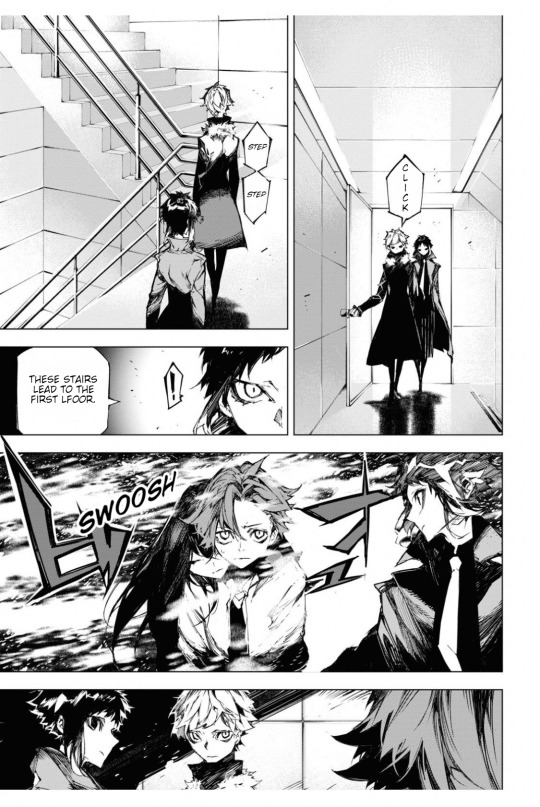
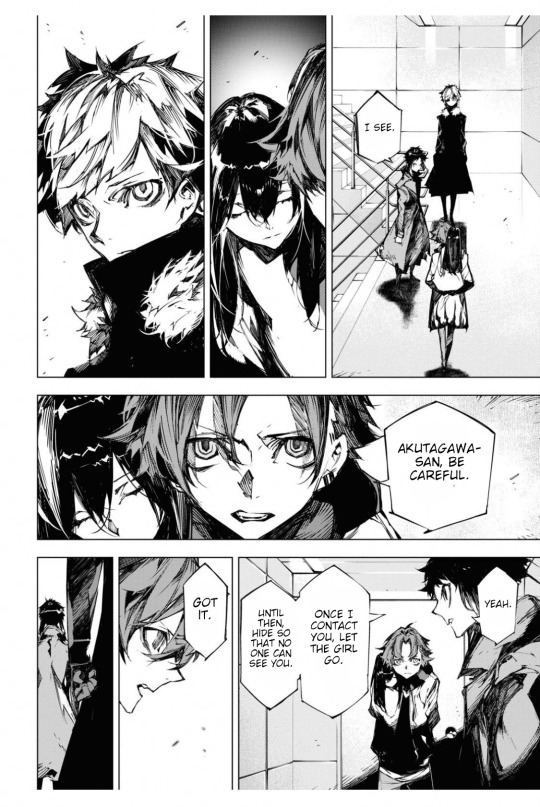
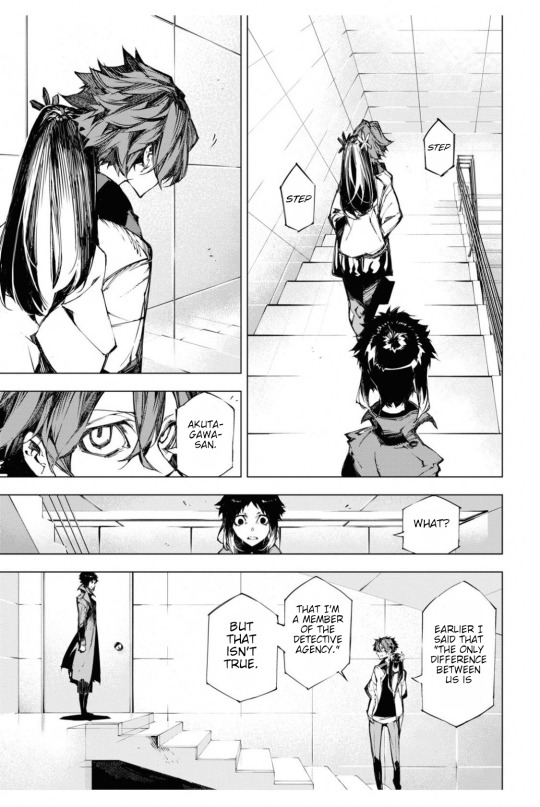
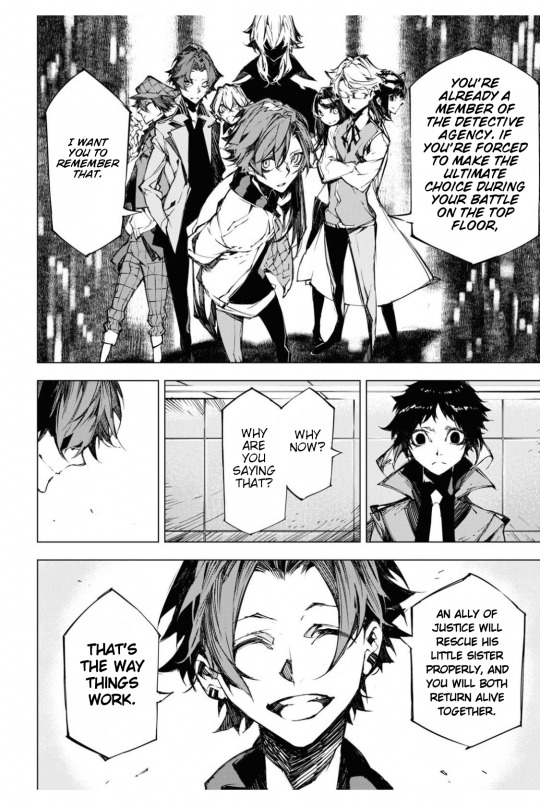
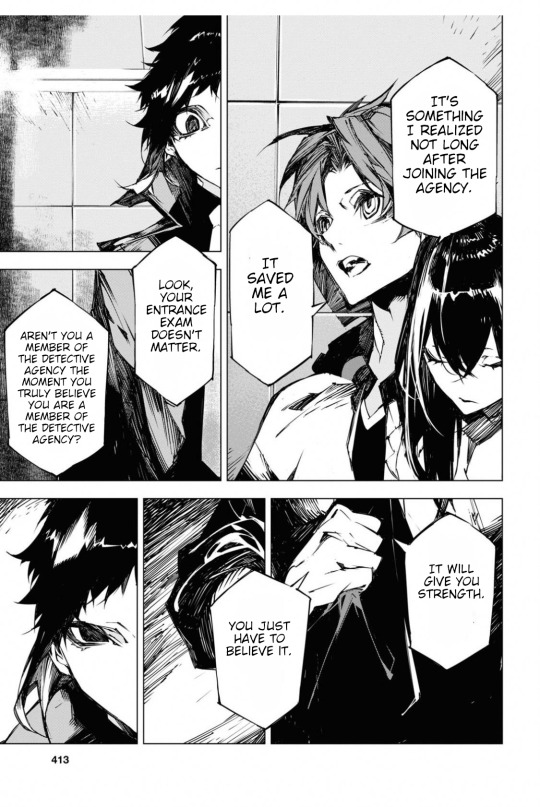
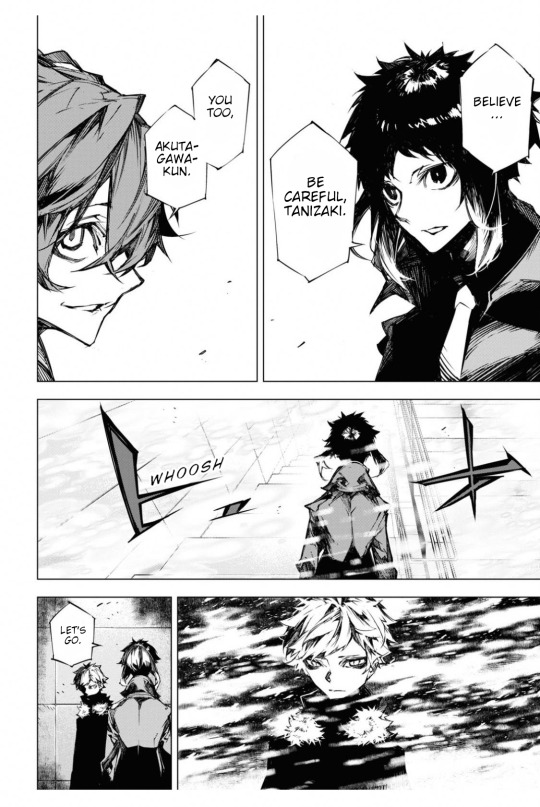
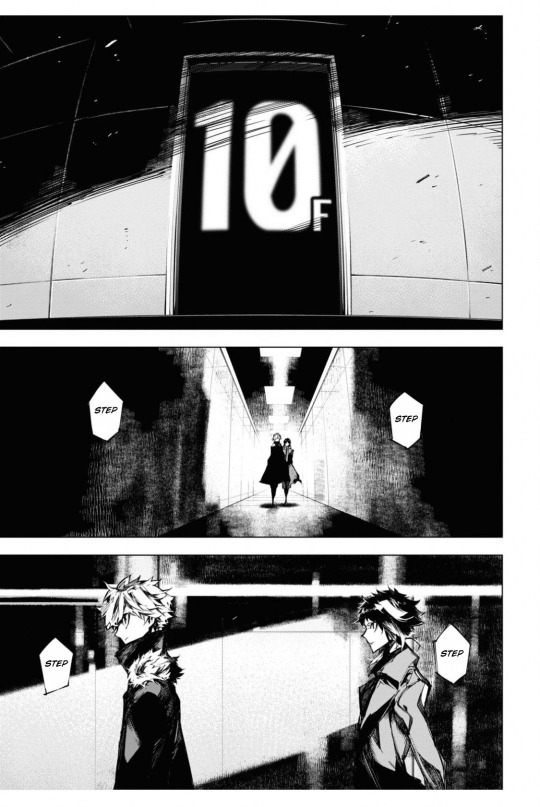
BSD BEAST Chapter 12 - Reunion
Part 1 | Part 2 | Part 3 | Part 4
-
Here’s chapter 12 of the beast manga, translated by me and typeset by caffeinatedseri. I hope you enjoy reading it!
116 notes
·
View notes
Text
Dead Apple Light Novel
Recently, I decided to buy LN 5, Dead Apple, purely because I’m a sucker for all of BSD’s light novels, so this post will revolve around what I took away from this novel.
Dead Apple is Canon
Since the story jumps around in the timeline a lot, I had originally thought that Dead Apple took place outside of canon (especially with Atsushi’s flashback).
However, a particular part of Asagiri’s afterword stuck out to me:
Now, allow me a moment to discuss some of the particulars of Dead Apple. Chronologically, the story takes place after the second season of the anime — in other words, after the war with the Guild, which puts Dead Apple somewhere between the ninth and tenth volumes of the manga.
The novel also ended up affecting the main story in numerous ways, and I’m sure this new experience will continue to influence my future work as well.
It’s not unusual for a light novel to insert itself into the main timeline (see 55 Minutes which takes place in the 10th volume), but it’s nice to have confirmation that the same applies to Dead Apple.
Of course, just because a work isn’t canon compliant (see BEAST), doesn’t mean that it has no potential for further analysis or it doesn’t bring any added complexity to the main plot. Regardless, this post serves as somewhat of a precursor to my other posts concerning Dead Apple since I have a tendency to talk about it a lot, and I’d like to establish a basis for a lot of my posts.
Differences between the Movie and Light Novel
In the afterword of the light novel, Hiro Iwahata (the author of this LN) said:
“Furthermore, I worked on this book under Asagiri’s supervision, meaning there are several lines in certain scenes that differ from the movie. It might even be fun comparing the two!
Nothing would make me happier than the fans enjoying this novel alongside the movie.”
As per Iwahata’s request, I went into the light novel, looking for differences between it and the movie. However, the novel is surprisingly, almost identical to the movie (maybe not surprising considering it is a “movie novelization”).
Because the differences are so miniscule, I believe they hold an even greater significance, since Asagiri must have wanted to change these specific details for a certain reason.
Some of the differences I talk about might be unimportant, but I did my best to catch everything that was changed from the movie.
1. The movie doesn’t mention SKK as a part of the Dragon’s Head Conflict, but the novel says, “Some fought under the alias Twin Dark.”
This probably means that SKK became a pair either before the Dragon’s Head Conflict or during (although I’m pretty sure that the “organization” they destroyed over night was Shibusawa’s organization).
2. When Dazai says that he would’ve continued killing people in the mafia if it weren’t for Oda, Atsushi has little to no reaction in the movie; I would describe it as maybe a hesitant or concerned feeling.

In the novel, Atsushi has a more outward reaction.
““Huh...?!” Atsushi was baffled. He had no idea whether that was true. What did Dazai mean by that? (...)
The melancholy Atsushi felt from Dazai had disappeared, and Dazai continued to speak in his usual lighthearted manner.”
Not only does he react verbally, but the novel also adds an inner monologue (mainly for Atsushi) that can’t be portrayed as well in movie format.
To me, this change highlights how Atsushi sees Dazai purely as a good person; he reacts in such a startled manner because he believes that Dazai is too good of a person to be in the mafia killing people (which we know Atsushi hates). This trend reoccurs throughout the story, of Atsushi turning a blind eye to Dazai’s “bad side.”
3. This one isn’t at all the movie’s fault, but the novel gives a lot more clues as to what the “dead apple” and the dagger in the apple motif represents.
The first time it appears is when Kunikida and Tanizaki meet the Special Division’s agent, but they find out that he’s already dead.
“It [the apple] was, without a doubt, a simple fruit... save for the fact that there was a knife sticking out of it as if to condemn the taste of sin.
A blade had been driven into the symbol of original sin. A dreary, ominous aura, oozed from the ripe fruit like venom.
Throughout the novel, it seems to associate the “dead apple” motif with Fyodor pretty strongly, especially since this paragraph ties in Fyodor’s ideals nicely with the symbolism of the apple and dagger.
The apple represents sin, the very first sin — which you could interpret as sin at its purest — while the dagger represents the condemning of such sin. However, the apple can also potentially symbolize life, while the dagger stabbing into life can mean death.
Fyodor’s ideals revolve around “removing the sin” of ability users (represented by an apple in this case) but he does so through manipulation. The dagger is associated with stealth and deception, which is fitting with what Fyodor does to “remove the sin” of ability users.
However, he’s also taking the lives of ability users in this process, hence stabbing the apple, coincidentally committing another sin in his attempt to relinquish all sin.
4. In the “Snow White” Oda and Dazai flashback, everything is identical to the movie (word for word), but there is some additional narration.
“It was an alarming sight — Dazai sounded like he was in a trance. It was as if he was ignoring all this world had to offer while in pursuit of something else.”
I’ve talked about this particular scene before here, but the gist is that Dazai was discreetly talking about himself while referring to Snow White.
Dazai joined the mafia because he believed that the violence (or true human nature) would give him a reason to live, but we already know that this kind of thinking was flawed.
Thus, this line most likely means that Dazai was ignoring all of the “good” qualities of the world while pursuing a reason to live, which inevitably wouldn’t work.
5. Right after the flashback, when Dazai takes the pill, the novel really sells the act of “Dazai walking towards his death and going to the evil side.”
Personally, this scene in the movie felt more open to interpretation after you’ve seen the ending. You could say that Dazai took the antidote and said “Being on the side that saves people is more beautiful,” because his plan is to continue living to save more people.
However, the novel throws away any possible double meaning with this paragraph:
“Dazai then reached for the pill with his bandaged hand, neatly picked it up, and slowly brought it to his lips — just like Snow White and the sweet, poisoned apple. The venomous red-and-pure-white-pill disappeared inside his mouth.”
After Dazai’s tangent on how Snow White could’ve committed suicide out of despair, the narration compares him directly to Snow White. With the added venomous pill stated outright, it only further cements the idea that Dazai’s actually committing suicide here.
I don’t particularly like this change, because it feels like this moment was set up entirely just to divert the audience’s expectations, rather than it be a standalone scene that makes sense when considering the rest of the story. (It might not necessarily be a change, possibly just a rough translation from movie to novel).
6. When Atsushi wakes up from his nightmare, there’s some additional inner monologue:
Everything’s okay. I’m not the same person I was when I lived at the orphanage. I have friends. I have a place where I belong — the Armed Detective Agency. Things are different now.
The anime (and in turn the movie) tends to downplay the effects of Atsushi’s trauma — probably due to the limitations of anime — but regardless the novel portrays it much better with how Atsushi’s trauma affects practically every aspect of his life.
7. I thought Fukuzawa’s ability only gave his subordinates control over their abilities, but the novel says:
“Yukichi Fukuzawa and his skill, All Men are Equal, a peculiar ability that allowed him to suppress and control his subordinates’ skills.”
Does this mean that Fukuzawa could control and suppress all of the agency’s abilities? It could be a weird translation, but it seems oddly specific.
8. This detail isn’t actually a novel exclusive, but it is an extremely small detail that I missed while watching the movie, so I figured I would add it here too.
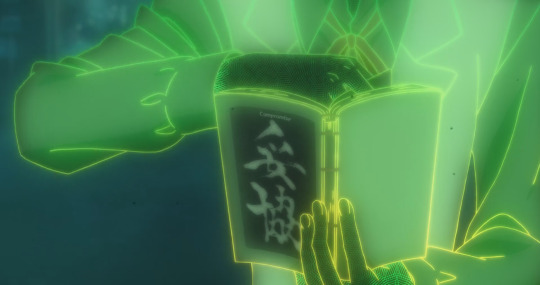
“the phantom’s notebook had the word Compromise written on the cover. A copy of himself that didn’t follow ideals but made compromises was an abomination to Kunikida.”
Considering how abilities act as the shadow to every character in this story, this is a nice detail that shows how Kunikida’s inner desire is to compromise, because carrying such heavy ideals is undoubtedly a burden. However, because he holds onto his ideals so strongly, it becomes his biggest weakness AND his biggest strength.
9. There’s a super small detail added to this scene with Dazai, Fyodor, and Shibusawa. When Dazai suggests that Shibusawa could be saved by an angel or a demon, the following exchange occurs:
“Hmm... Maybe an angel?” Dazai picked up the skull on the table. “Or maybe a demon?”
“It’s obvious what both of your true intentions are, if you ask me.” The third man mirthfully cackled and took the skull from Dazai’s hand.
In the movie, Dazai doesn’t pick up anything, so as a result Fyodor doesn’t take anything from Dazai either.
Because Fyodor walked into the scene after Dazai suggested that an angel or demon would save Shibusawa, I strongly suspect that this was foreshadowing future events in which Fyodor does “save” Shibusawa by giving him his memories back.
The novel adds more to this foreshadowing by having Dazai pick up the skull before it’s taken by Fyodor — essentially having Fyodor take the cards out of Dazai’s hands and put them in his favor.
It’s also worth pointing out that the skull is also the object that Fyodor uses to revive Shibusawa into a supernatural ghost of some sorts at the end of the story.
10. This may be just a difference in translations but in the movie, Shibusawa refers to Fyodor as “Demon Fyodor-kun”, whereas in the novel Fyodor is called “Fyodor the Conjurer.” (Ango uses the Conjurer title as well).
In western esotericism, a conjurer is a person who summons supernatural beings, like spirits, demons, or God.
This slightly changes the connotation of Fyodor’s title from a inhuman being of pure malicious intent to just a human who summons these otherworldly beings. This idea also aligns with Shibusawa’s revival, since he’s some sort of supernatural ghost that was “summoned” by Fyodor.
11. Skipping past the parts where Kyouka and Akutagawa regain their abilities, and Chuuya talks to Ango in the government facility, (since they have little to no changes between the movie and the novel) there is a somewhat significant detail changed in Draconia once again with Dazai and Fyodor.
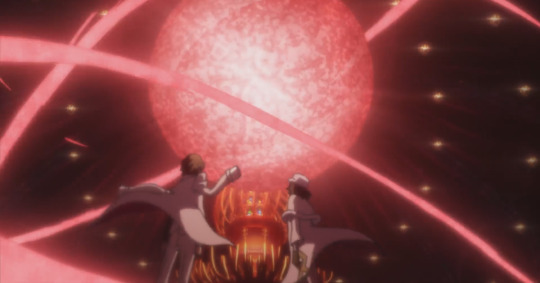
In the novel, this glowing ball of energy from the movie is actually described as an apple:
The two lights melted into one and spun until they formed a juicy sphere. They had produced a single apple — a juicy, poisoned apple red as blood.
It birthed a skill — and an extremely powerful one at that — the ability to absorb. Every last crystal adorning Draconia’s walls was sucked into the apple with intense force. Ten — a hundred — a thousand — two thousand — every last one was greedily devoured by the apple...
The apple swelled as it absorbed the numerous crystals until the red light became hotter than the surface of hell.
Since the “dead apple” motif aligns with Fyodor’s character, we can assume that the apple is representative of sin, and sin is associated with abilities, as Fyodor believes.
This strange poisoned apple is made of abilities and has an ability (the ability to absorb), and it commits a sin (greed) in its devouring of other abilities; it’s also hotter than “hell”, which is a very specific connection that leads me to this idea:
My theory is that a normal apple represents life, while a poisoned apple (or dead apple), indicative of a stained, impure life, represents sin. Fyodor believes abilities are akin to sin (what a clever rhyme), therefore all of their lives are sinful.
12. This is arguably the most insignificant change of this entire post, but I feel obligated to put it here regardless since it was different from the movie. When the Special Division detects the singularity of Shibusawa’s dragon form in the novel, it says:
“Abnormal values for singularity are increasing! They’re twice — no, 2.5 times higher than they were six years ago.”
In the movie, the number is five times higher instead.

Why did this number change? Is it significant? I honestly have no idea (I’m surprised I even caught this), but it’s there and I had to document it anyways.
13. The novel adds this narration for Shibusawa when he gets his memories back and he’s in the orphanage’s room with Atsushi:
“Shibusawa clearly recalled the events from six years ago. Fyodor had enticed him to go to the orphanage where he tortured a young Atsushi... until Atsushi fought back and killed him.”
There’s two things to take away from this: Fyodor had known Shibusawa for at least six years, and Fyodor had been planning the events of Dead Apple since at least six years ago.
I find it hard to believe that Fyodor’s plan was thwarted by Dazai, because of how Fyodor demonstrated his ability to plan ahead in the main series, but I’m not sure what the long term effects of this plan could be. If Shibusawa succeeded, then it could’ve aligned with the DOA’s goals, but once again I don’t think Fyodor’s plan was actually foiled.
14. Super minor once again, but right after Shibusawa gets revived, the last sentence of chapter 5 is,
“Nobody would ever see the smile on Fyodor’s face.”
Honestly, I think this was just added to create an ominous tone, but it’s a nice detail regardless.
15. As the red fog spreads across Yokohama, there’s a good part of exposition that connects the “dead apple” motif to Fyodor once again:
“After the red fog devoured the earth, the planet would undoubtedly look like a floating red apple from space. There would be no humans left on its surface, nor any signs they ever existed. It would be a true paradise, and with that, the Dead Apple would finally be complete. A dead planet covered in red fog — that was what Fyodor had planned and sought out.
Nothing other than death could wash away the original sin of man, so it was only fitting for the sin, which started with a fruit, to end with one as well.
It’s pretty long, but I like the way this passage is written, more specifically the last part since it fits well with the sinful poisoned apple idea.
It also aligns with Fyodor’s ideals of creating a true paradise, free of ability users. However, if Fyodor had planned to have the Earth covered in fog, that could mean that his plan was actually stopped by Dazai and Atsushi in the end.
16. Shibusawa has a few additional lines of dialogue when he talks to Atsushi in their final fight.
“The dragon and tiger... I see now why they are called rivals.”
The dragon and tiger have their roots in Chinese Buddhism, but to go further into that topic would make this already lengthy post even longer.
“Don’t get the wrong idea, though. I’m not blaming you for what happened.”
This line is a brief moment of weakness for Shibusawa, which is interesting in contrast to his strong will to kill Atsushi. Just as Atsushi learned to accept the past and the tiger’s ferocity, Shibusawa shares the same attitude by separating the blame from himself to just simply accepting the past for what happened.
17. In the aftermath of the last fight against Shibusawa, Atsushi and Kyouka meet up with Dazai.
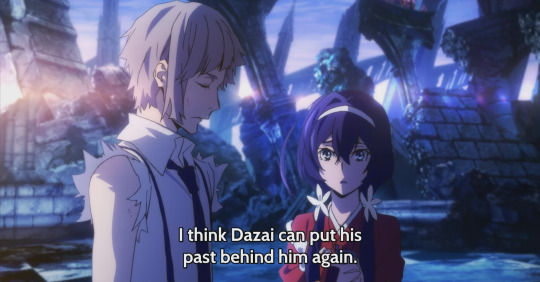
Kyouka asks, “Are you sure this is what you wanted?” which prompts two different responses in the movie and novel respectively.
In the movie, Atsushi says, “Just as Shibusawa was able to forget that he’d been killed before, I think Dazai can put his past behind him again. But this is fine.”
In the novel, Atsushi says:
“... I could probably seal away this memory just like how I’d forgotten I’d killed him before. But... I’m okay with this.”
I interpreted Kyouka’s question in the movie to be questioning Dazai’s loyalties, as he did betray everyone, and Atsushi responded in Dazai’s defense because he trusts him.
However, the novel does change Atsushi’s response to focus on himself rather than Dazai, which in turn changes the implications of Kyouka’s question.
Kyouka seems to be asking Atsushi whether he was okay with killing Shibusawa, and Atsushi responds by acknowledging that he did kill Shibusawa, and that’s okay. (a very clear development from the beginning of the story when he believed it was unnecessary to kill anyone, and he didn’t want to kill anyone)
18. In the epilogue, Ango talks about the underlying motivations behind the “Dead Apple” case. This change could be attributed to translation differences (like many others in this post), but the connotation does slightly differ from movie to novel.
In the movie, Ango says, “How is a man like Shibusawa, so intelligent that others look like alien creatures to him, to act, to be destroyed, or to be saved?”
In the novel, Ango says:
“Perhaps the two of them [Dazai and Fyodor] just wanted to get a glimpse of someone like them... Perhaps they wanted to see what he would do and how he would meet his demise... or perhaps how he would be saved.”
The movie simply poses a broad question of what would happen to Shibusawa, a person alienated from the rest of society.
The novel changes this to focus on Dazai and Fyodor’s perspective — two irredeemable aliens from society just like Shibusawa — executing this grand scheme out of curiosity to see what would happen to someone of the likes of them, and if there’s a possibility for redemption.
19. This is the final difference on this list, and it’s quite a large change. In Fyodor’s monologue at the very end of the story, he has a completely different tone from the movie to novel.
In the movie, Fyodor says, “But in order to end this world, rife with crime and punishment, I do need that book.”
The novel says:
Glittering high-rises and stately brick buildings stood side by side in this port city with its countless citizens who struggled against crime and punishment.
“I think I’ve taken a liking to this city myself..”
Fyodor took a bite of the apple in his hand, and the juicy nectar ran down his delicate fingers.
“You’d all better be on your best behavior until next time.”
The reference to the book may have been removed for consistency with the main series, as the book is a part of the DOA’s plan (or more specifically Fukuchi).
It also seems like Fyodor has grown fond of the city, and no longer wants Yokohama to be destroyed, so it’s still possible that his plan deterred from what he had originally intended.
Beyond that, I’m not entirely sure why crime and punishment was mentioned, or why there’s such an ominous tone to his ending statement, but that’s up to personal interpretation.
That concludes the long list of extremely specific and minor differences between the Dead Apple movie and light novel!
Overall, I would say it’s worth checking out the light novel if you don’t have a strong grasp of the Dead Apple story, because it definitely presents the small intricacies of the plot in a more comprehensible way.
On a side note, the manga adaptation has a lot of noticeable differences from the movie and light novel, mostly with the addition of entirely new scenes (which you can read @buraihatranslations — what a shameless self plug). I would highly recommend reading it as those extra scenes are very amusing, to say the least without giving any spoilers.
Honestly, this post was a lot longer than I intended, but I hope you enjoyed it regardless. Thank you for reading!
399 notes
·
View notes
Photo
chapter 11 super scary ~~
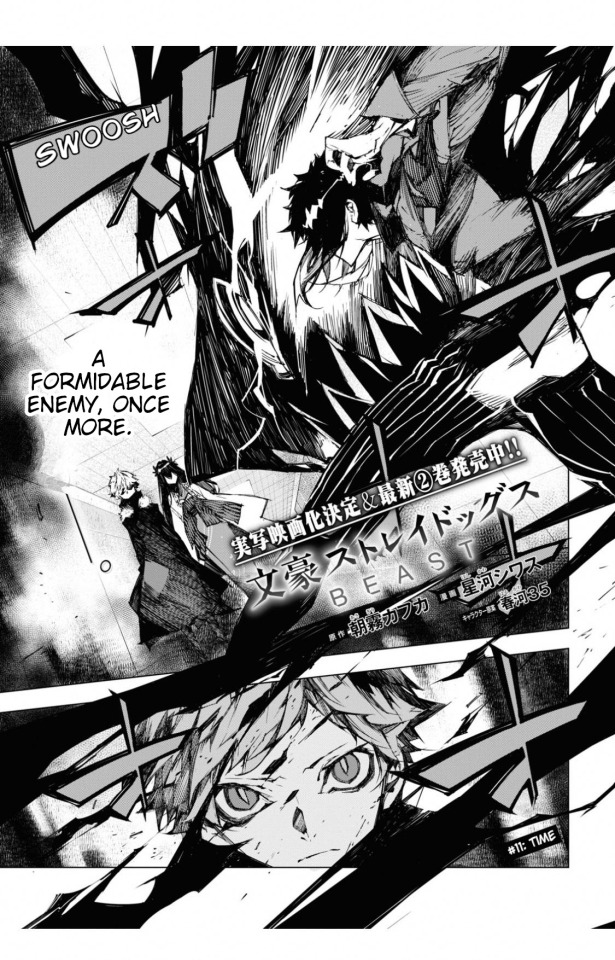
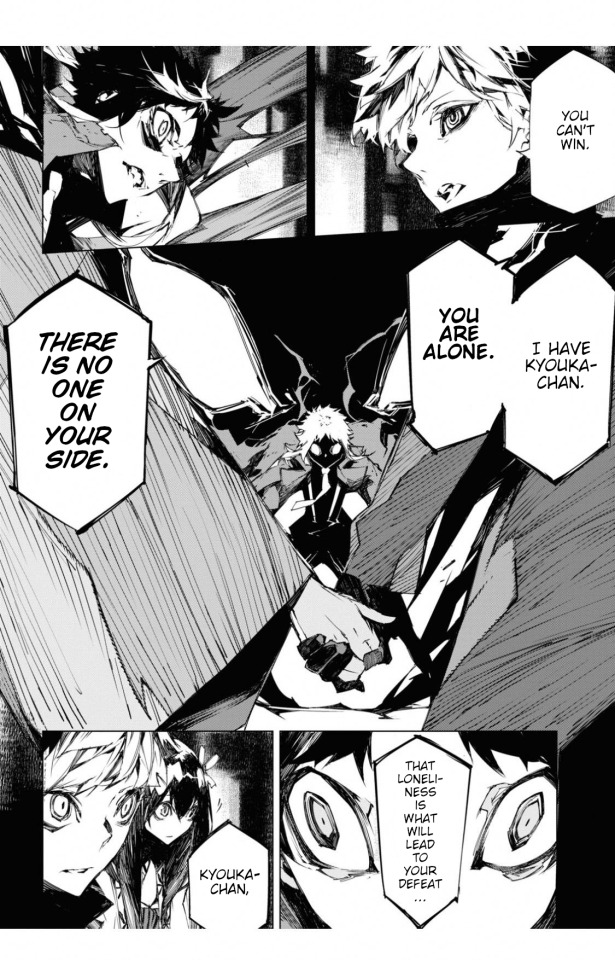
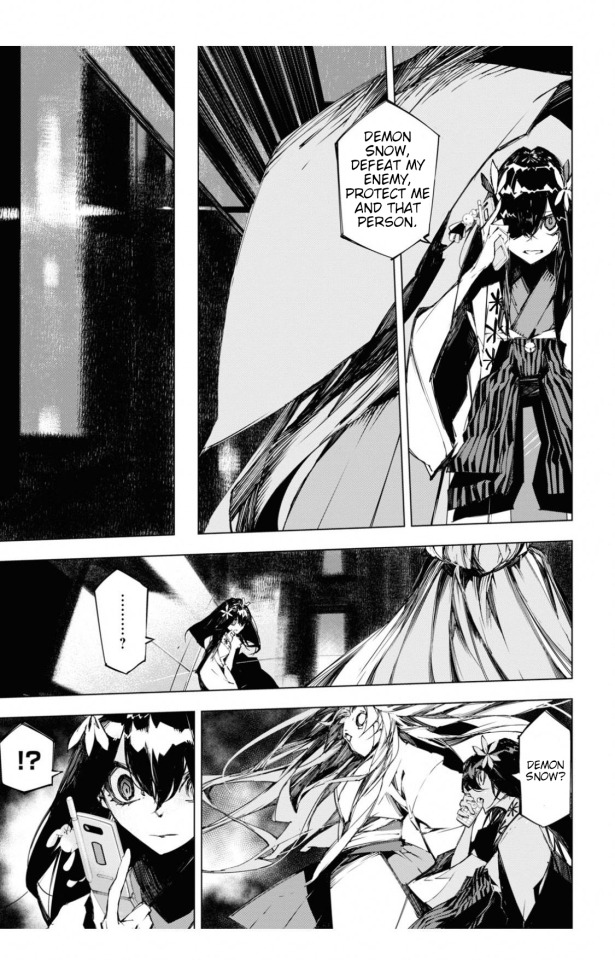
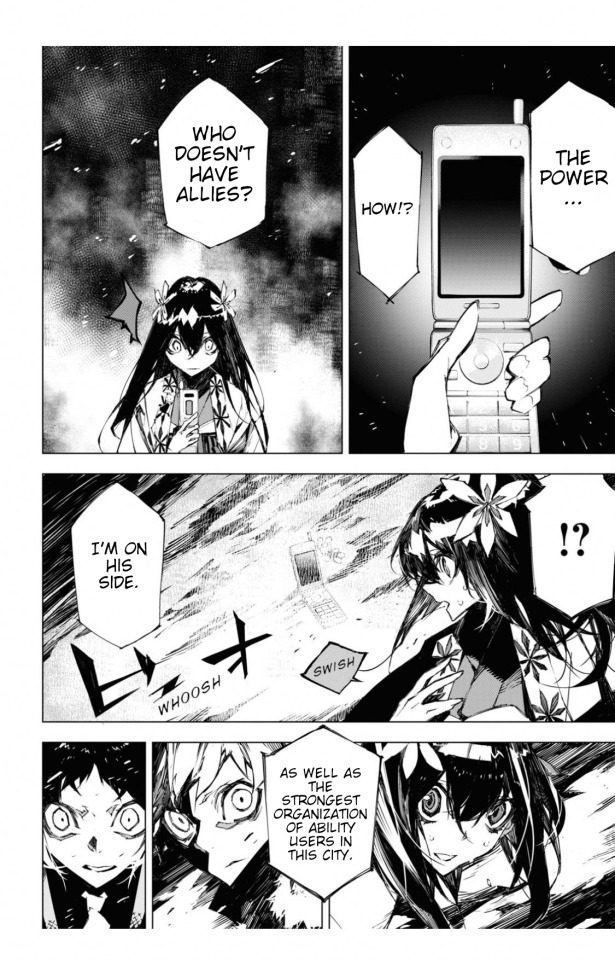
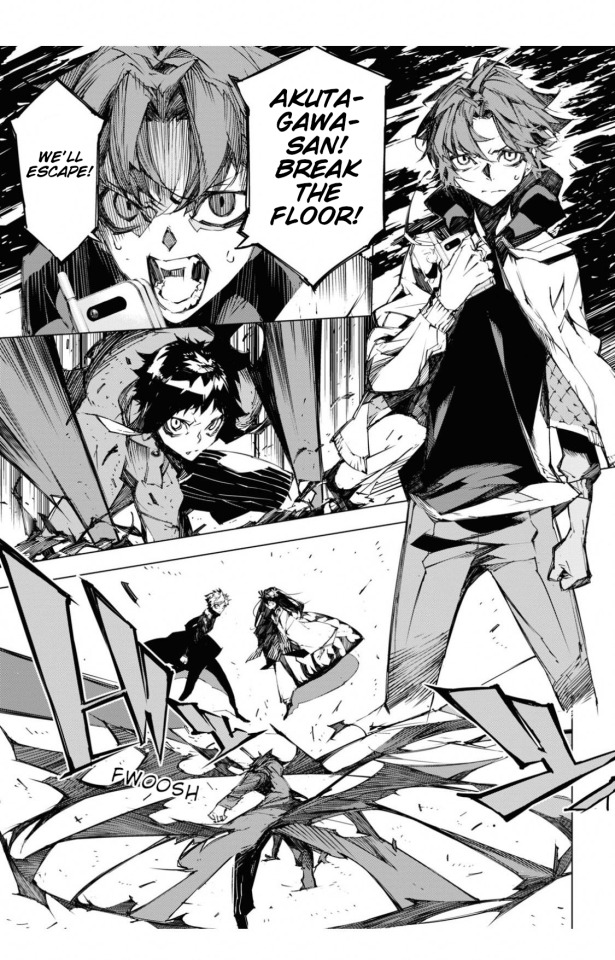
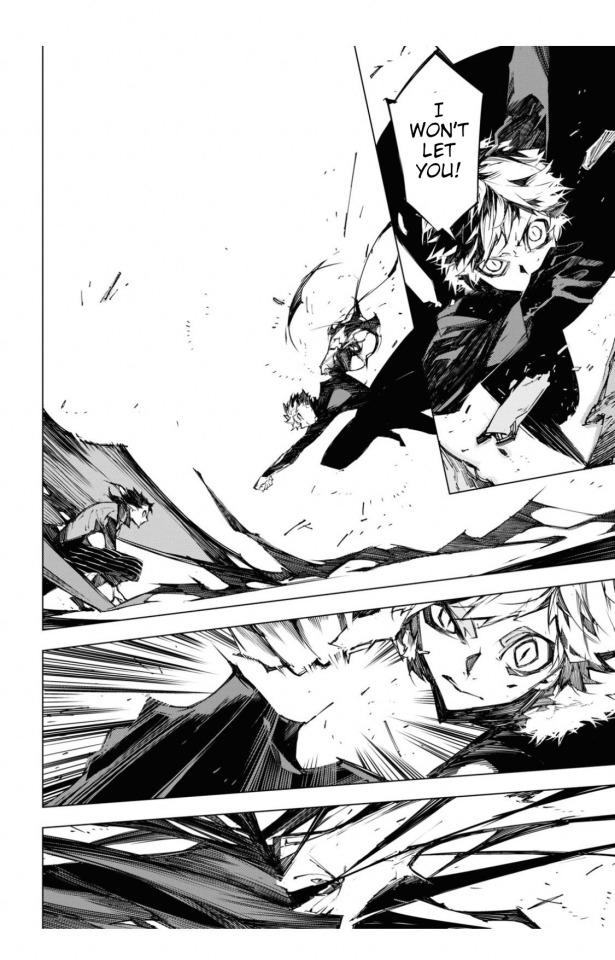
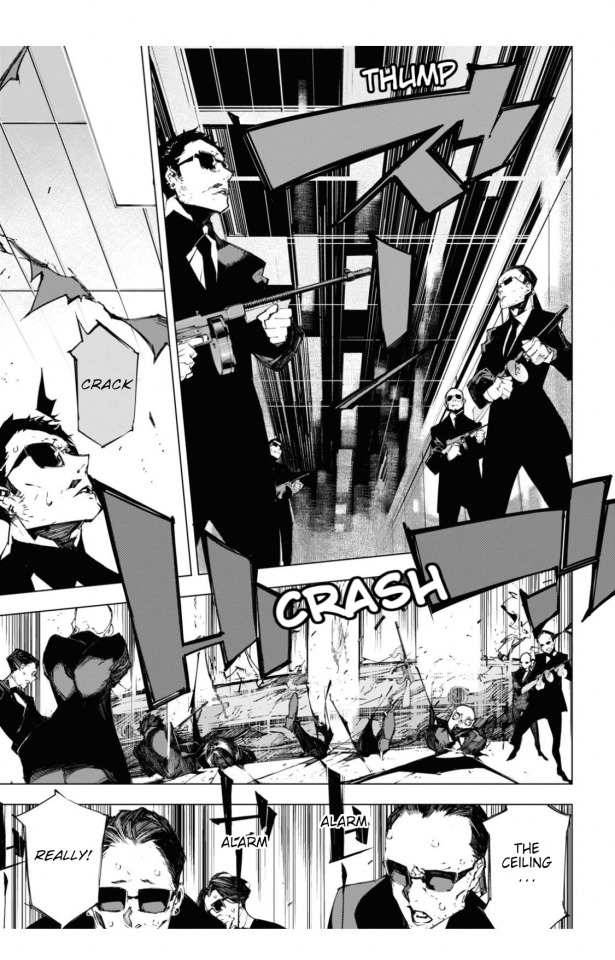
BSD BEAST Chapter 11 - Time
Part 1 | Part 2 | Part 3
-
Please enjoy chapter 11 of the beast manga, translated by me and typeset by caffeinatedseri. Keep an eye out for other chapters in the future!
71 notes
·
View notes
Text
thank you for researching all of this !! all of this seems like a lot of jumbled parts but here are some possible (maybe vague) connections i see:
1. the orphan, Toru, in “The Decay of the Angel” sounds a lot like Dazai but i’m not sure what his possible involvement with the DOA could be...
2. the way Honda draws conclusions about Toru is really arbitrary, as you nicely put it — he fixates on “very superficial things.” this kind of irregular thinking could connect to how each member of the DOA is flawed in their respective yet wildly different ideologies:
fukuchi wants to overthrow practically all governments, but he has no plan to reinstate order or secure peace after he does so.
fyodor wants to eradicate all ability users, but he seems to have a god complex or believe that it’s his duty to follow suit with an extremist plan such as that (without seeing possibly less violent solutions).
nikolai wants to free himself from his own conscience by killing, but by doing so he’s becoming increasingly aware of his inner conscience. (he also wants to kill fyodor, his only “friend” which is almost counter-productive in a way)
sigma wants a place to belong to, but he chose the DOA which is arguably the most fragmented group he could possibly find in the BSD universe.
we don’t really know much about bram, but he doesn’t want to cause another calamity, but he does so anyways because of fukuchi’s power over him.
3. “decay of the angel” could possibly connect to fukuchi himself? since fukuchi is the leader, it makes sense that he was the ‘angel’ that ‘decayed’ as he was a war hero that turned to anarchy due to the trauma that came from war.
i’m not sure whether asagiri tends to use the real authors’ lives or their works more for characterization, but maybe knowing that would help considering the far-right ideologies of these authors doesn’t exactly align with their corresponding characters.
Recap on The Decay of Angels
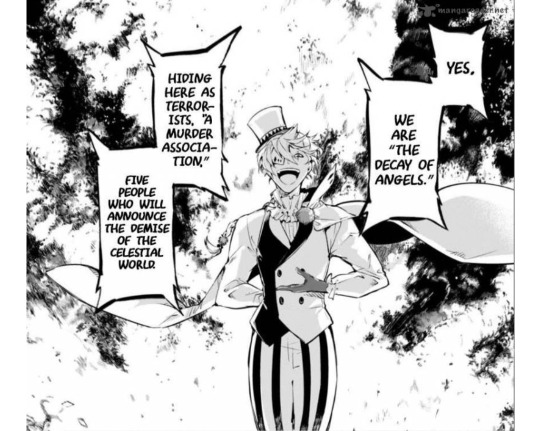
Above, our introduction to the villains that have dominated the Bungou Stray Dogs manga for a few years as of now. It tells us two main things: that they are terrorist, and that they are five. Of them, two are known: Dostoevsky, already introduced in the previous arc, and Gogol, who debuts in this chapter.
As of chapter 88, all of the five members are known, and a few of these identities have been puzzling for the public at large. So, I want to try and recap what we know of them, and maybe make a little sense of it (spoiler, I didn't, but I found a few interesting facts).
We already met Fyodor in the Cannibalism arc, and gained an idea of who he is, how he operates, and what he wants. He's the leader of his own organization, but fights his battles mostly indirectly, by manipulating others into fighting for him.
He aims at destroying Yokohama to find the famed Book, the one to rewrite reality, for the purported reason if creating a better world, one without the 'sin' of ability users. Why he does think like that, or exactly what kind of different world he does envision, is unknown to this day.
Later, in chapter 56, we are shown the Decay of Angel's deeds, four in one week, which our resident nerd Kunikida explains are related to four of the five signs of the imminent death of an angel (or 'deva' in the Buddhist conception):
They skinned a legislator's torso, made a shirt with the result, and put it back on him, all in five minutes = the angel's robes are soiled.
They melted off the face of a deputy commander in the coast guard with a corrosive poison = the angel's garland melts away.
They stuck an air compressor in the mouth of the secretary of a general in the ministry of defense, causing his blood vessels to pop out = the angel's radiance fades.
Lastly, an official for the military police was injected a drug that caused him to kill himself = the angel's armpits start to sweat.
Moreover, they're suspected to have ties in the government; turns out, Gogol was cosplaying as a secretary in there.
He takes hostage a bunch of government officials, and threatens to saw them in two ("losing delight in their heavenly thrones")
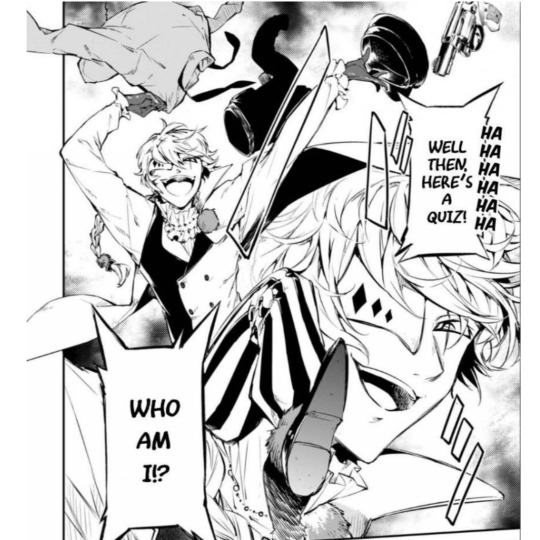
The next chapters are dedicated to introducing Nikolai Gogol: an eccentric individual with a powerful ability and the most likely perpetrator of all the aforementioned crimes (since Fyodor was in jail at the time and, as we'll see shortly, the other members aren't particularly suited to these kinds of jobs).
However, he admits that he does feel guilt for what he does, and it's the reason he keeps doing it: he wants to free himself from the concept of morality, from his own conscience.
While this is a rather interesting philosophy, it doesn't expand much on why and how he joined the Decay of Angels. Was he a 'normal' person with particular ideas on morality that were brought to the extreme by the other members in order to make him useful, or was he already a murderer, and joined the Decay to have a wider choice of targets?
Boh. We'll only know quando Asagiri si decide a recuperare il suo arco porca pupazza with time. Still, the important part is that he doesn't seem to share Fyodor's objectives, nor does he say anything about the greater plan and his ideas on it. This is the first indicator that the Decay is a rather fragmented group, everyone is in for his own goals.
However, the last interesting thing is that the plan involved his own death: those in the Decay have no problems sacrificing their own members (even if I have a little theory that Fyodor might have planned for his survival, but I'll talk about it in another post).
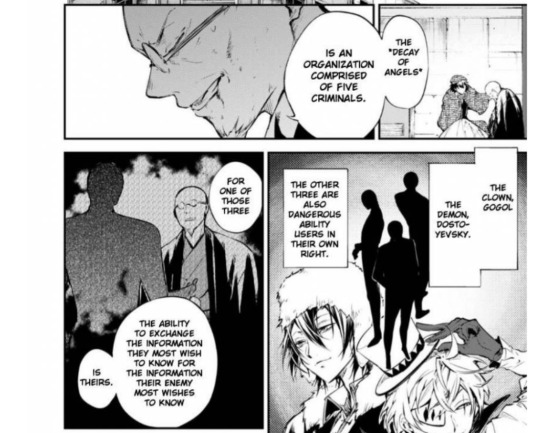
Next, a wounded Taneda adds an information about the Decay of Angels: of the three members still in the dark, one has the ability to exchange knowledge he wants for information the person he touches wants. Namely, they're looking for a book, one that makes so that what is written on it becomes the truth - something already hinted by Fyodor. They managed to locate one page of it, and used it to frame the Armed Detective Agency to create a chaos and instigate a sort of Ability Civil War to destroy the city.
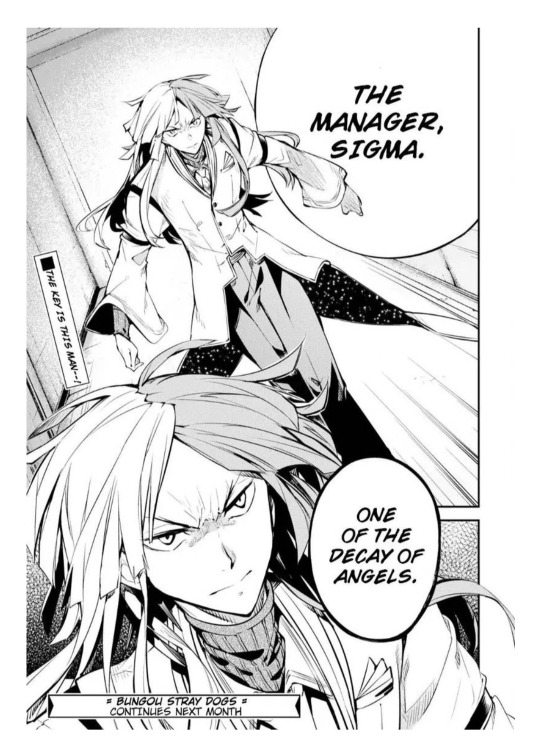
Their 'knowledge broker' is revealed to be Sigma; a reveal that is quite a surprise for the reader, since the manager of the Sky Casino has been introduced rigging a game to allow a person desperately in need of money to win; a very positive introduction, for a member of a 'murder association'. Later, it's revealed that he didn't even want to stab Taneda, only scare him off.
In fact, he hasn't even joined them because of some ideal: Fyodor found him when he had no past nor family nor anywhere to go, and offered him a place to belong in exchange for his services. When it turns out that his colleagues in the Decay have planned his demise (and two!) and Atsushi shows him kindness, he promptly cooperates with the Agency; or tries to, before one of Fyodor's lackeys shoots him.
It's also revealed that the group has created some explosive coins, released to the population at large to make some other acts of terrorism.

After some other shenanigans, we are introduced to their boss: Ouchi Fukuchi, officially the war hero who wants to save the world from the 'terrorists' known as the Armed Detective Agency by instituting an international police force.
Unofficially, a former torturer sanctioned by the government, traumatized by what he found himself doing. He wants to take down every nation, throwing the world into anarchy, because he believes countries and governments responsible for wars; and he also wants to stick it to his childhood friend who wasn't with him on the battlefield and got a found family he didn't have, and so framed him as the leader of the terrorists.
His actual plan was to terrorize the population and the government enough that they would gladly let him create an international armed force at his commands, which he would actually have used to break down the concept of 'State'.

Lastly, the fifth member: Bram Stoker. Another interesting case: like Sigma, he doesn't have any particular ideal that brought him to the group; on the contrary, he dislikes them. He used to be known as a calamity for his ability to turn others into vampires, and swore to never do such a thing again. He breaks this promise because Fukuchi threatened to kill him otherwise, and already keeps him in a state of prisony; personally, he has no interest in destroying the world, and thinks Fukuchi should do it himself. Considering that he interacts only with him, and doesn't keep track of the time well, I wonder if he even knows the other people in the organization.
Another interesting thing, is that he is the first British author to get introduced, except for Agatha Christie, who is hinted to be the leader of an organization of European Ability Users, but hasn't made an appearence since chapter 12/Dead Apple, and insofar hasn't had any impact on the plot. Maybe Stoker will be the element that brings the 'Order of the Clocktower' in?
Anyways, here they are: a group of people with vastly different goals and mindsets, ready to send each other to death and put dents into the others' plan (Sigma being ready to tell everything to Atsushi, Fyodor likely putting intentional mistakes in the Page he redacted to undermine Fukuchi).
Honestly ... it's amazing such a branco di disagiati group of people that want so wildly different things managed to last so long, let alone do this much damage. I mean ... how and why these people came together? What do they have in common?
To try and find answers, I did a little research.
First of all, the name 'Decay of Angels' comes, surprise surprise, from a book.
'The Decay of the Angel' by Yukio Mishima is the last novel in a tetralogy that follows the story of Shigekuni Honda, law student in the first novel and retired judge in the last, as he spends his whole life looking for the reincarnation of his deceased schoolfriend, finding them in people that seem to inevitably meet an early death, and ultimately destroys himself.
In the last installment, Honda decides that the reincarnation is an orphan, Toru, that behind a nice and normal facade hides antisocial tendencies. The interesting thing is that Honda notices them, but dismisses them as 'guile': what makes him decide that Toru isn't the reincarnation of his friend is the fact that he doesn't die on a certain date. And after all he had decided that he could be his friend after noticing a similar mole pattern; both very superficial things to originate and conclude such a fixation.
So what? I don't know.
Is a reference on how Fukuchi envied his childhood friend Fukuzawa for never dirtying his hands the way he had to do, and for having a found family, or a 'path in life', and decided to do a distorted version of such, with a few criminals and a plan to destroy the current order? Not sure.
Let's move to the artist, then!
Yukio Mishima was something of a conservative, and he strongly opposed the westernization of Japan, arguing that it left its people rootless. By this, I mean that he founded a private militia, the Tatenokai, composed of a bunch of students recruited with the newspaper, who until the 1970 did not much more than physical exercise and worship of the Emperor.
On the 25th of November 1970, however, Mishima plus four (!) of them briefly seized control of the Self Defense Force headquarters and tried to encourage the soldiers in a coup d'etat. They failed; Mishima and Masakatsu Morita, one of said four followers, committed suicide by seppuku, the latter despite his commander's wishes. The other three ended up in prison.
So, we have a strong believer in the traditional values of the State; quite the opposite of the 'anarchist' Fukuchi.
However, Mishima does not appear as a character, even if, since he was a writer, he could very well have. Instead, a bunch of appearently unrelated figures compose the terrorist group.
Fukuchi Genichirou was a translator, journalist, and playwriter. He, too, was a conservative: in his youth, he wrote an article criticizing the government and was subsequently arrested; he was released for the intercession of an influent friend, but this is remembered as the first episode of suppression of free speech in the Meiji Restauration.
He later founded a very short-lived political party that pursued the sovereignity of the Emperor, enforcement of a Constitution established by the Emperor and election among limited people. This party disbanded after one year.
Fyodor Dostoevsky is best known as a novelist, short story writer and journalist. He was also involved in politics: initially, he was interested in socialism, fluctuating among several groups due to an interest in social reforms in favor of destitute people.
The last group he joined (despite having been described by Bakunin as essentially a bunch of posers) got him convicted for reading papers that criticized the Russian government and religion, and nearly sentenced to death; the letter by the Tsar that commuted the sentence in prison and hard labour arrived just as the convicts were right in front of the firing squad, leaving them all free to enjoy this deeply traumatizing experience. He was considered one of the most dangerous prisoners (he read some books). Later in life, he moved towards more conservative beliefs (conservative for Russian standards: he criticized both socialism and capitalism, idealized the monarchy, and asserted that every social problem could be solved with Orthodox Christianity); but he didn't try to take an active role in politics.
Nikolai Gogol was a novelist, short story writer, and playwriter of Ukrainian origins. Despite costantly satirizing the government in his works, he was a strong supporter of the tsarist monarchy and criticized those who wanted a costitutional monarchy.
Fittingly for 'a character with no past', researching Sigma was a real pain. Shoutout to @gravitycantstop for pointing me in what is probably the right direction.
Sigma was a pseudonym of Russian journalist and writer Sergey Nikolaevich Syromyatnikov. Appearently, decent information about him is available only in Russian. Now, one day I'll speak every language in the world, but insofar my knowledge of Russian is limited to 'vodka' and 'syrniki', so I can't say much about him. If anyone who reads this speaks Russian and can provide information, please do so!
Lastly, Bram Stoker: he had a keen interest in Irish Affairs, was a strong supporter of the Liberal Party, which favoured social reforms, personal liberty, and reducing the powers of both the Crown and the Church of England. He supported Home Rule brought about by pacifist means, was an ardent monarchist, and believed Ireland should stay in the British Empire, which he saw as a force for good.
So? I'm not sure what to make of all of this. The only thing I can say is that a bunch of real-life right-wingers has been turned into essentially a bunch of far left extremists? Sure, Stoker has been around for too little to express any ideology besides 'fanculo 'sta merda I want to sleep', and the lack of information on Sigma means that I can't make theories on him. But still, it's the closest thing I could find that binded them all together.
I admit I'm still unsure about what this could mean. Surely they weren't the only boomers ante litteram strongly conservative authors Asagiri could find, so ... I guess we have to wait and see? I literally made this post as I went, trying to find a common denominator, and this was all I could manage.
Anyways, I hope this can be somehow interesting.
Thanks to anyone who bothered to read my ramblings!
214 notes
·
View notes
Photo
a very intense chapter ~ please enjoy !
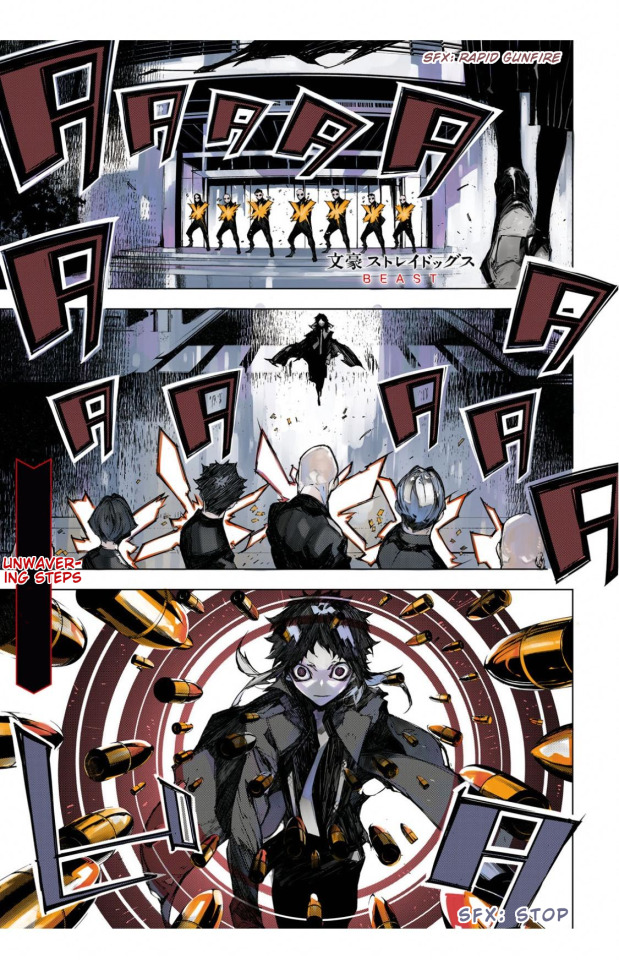
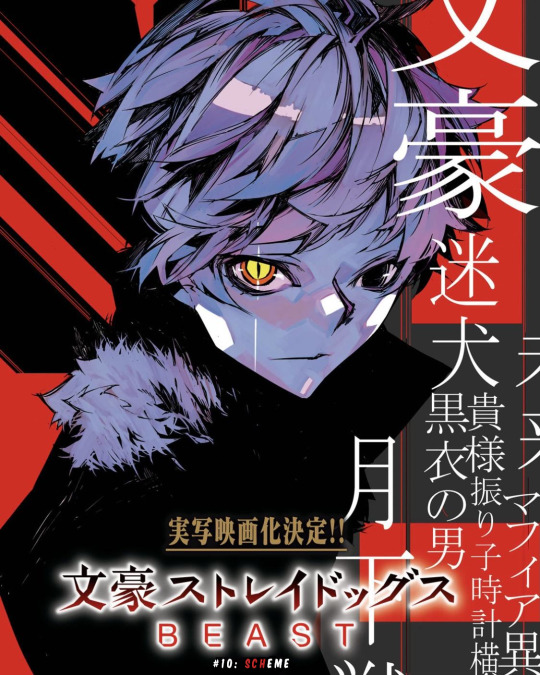
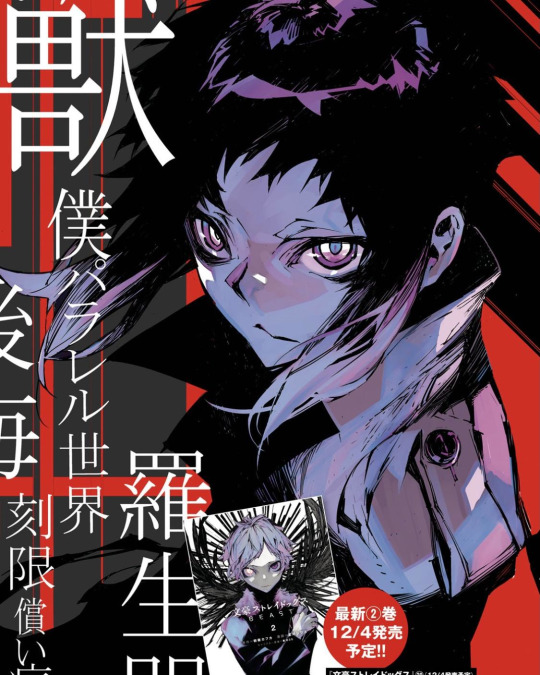
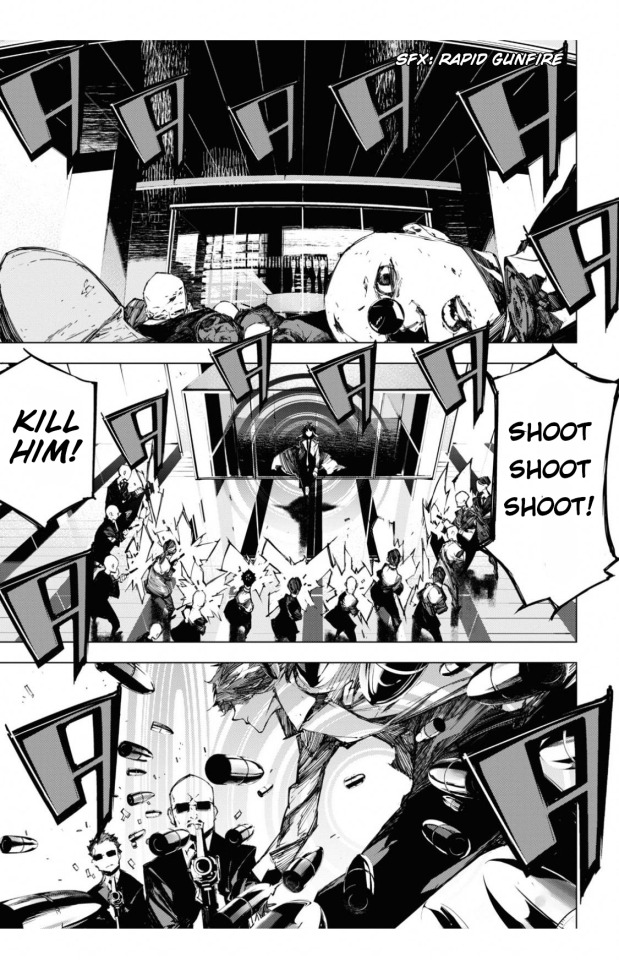
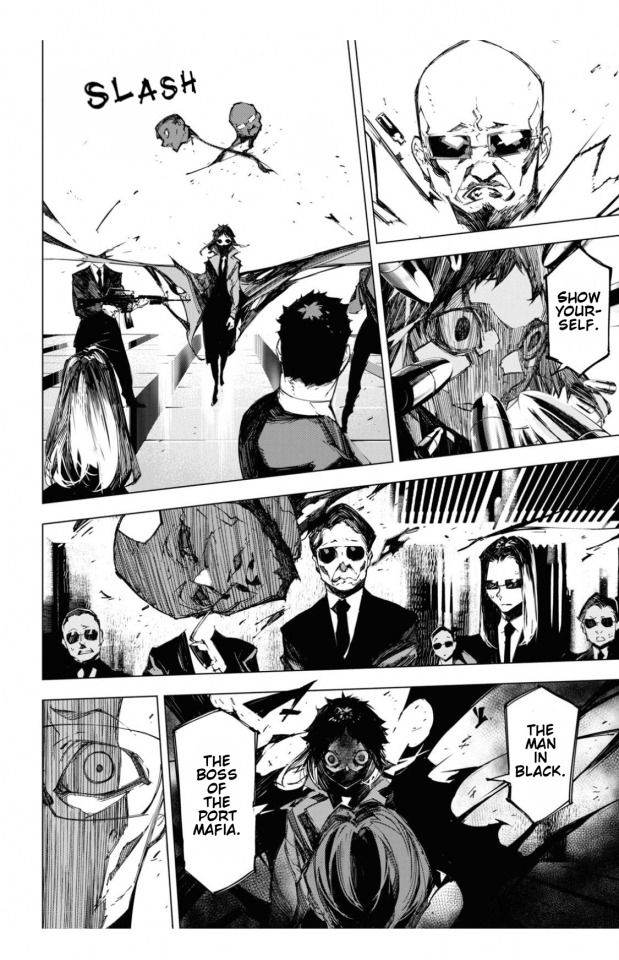
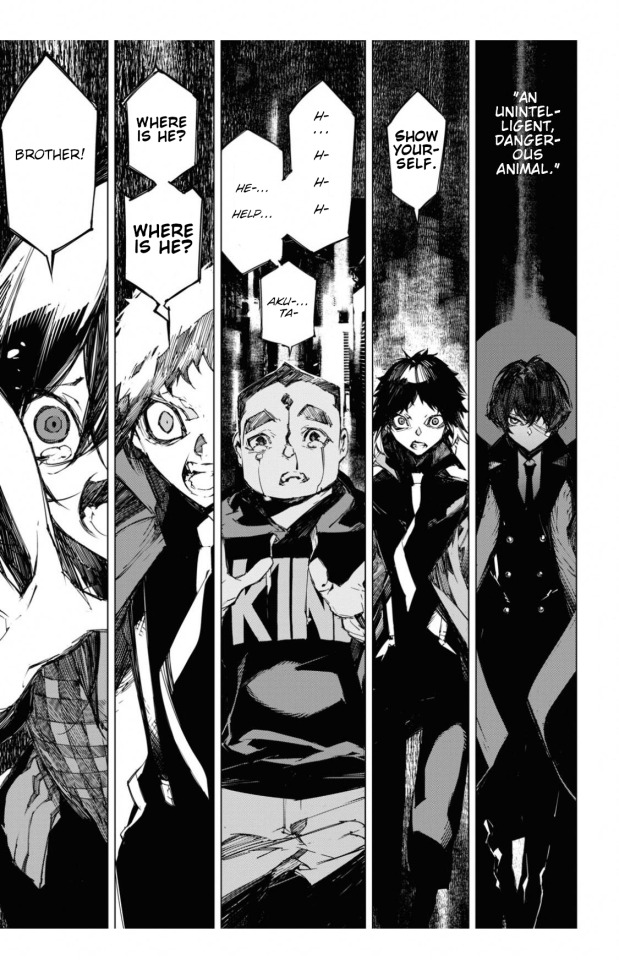
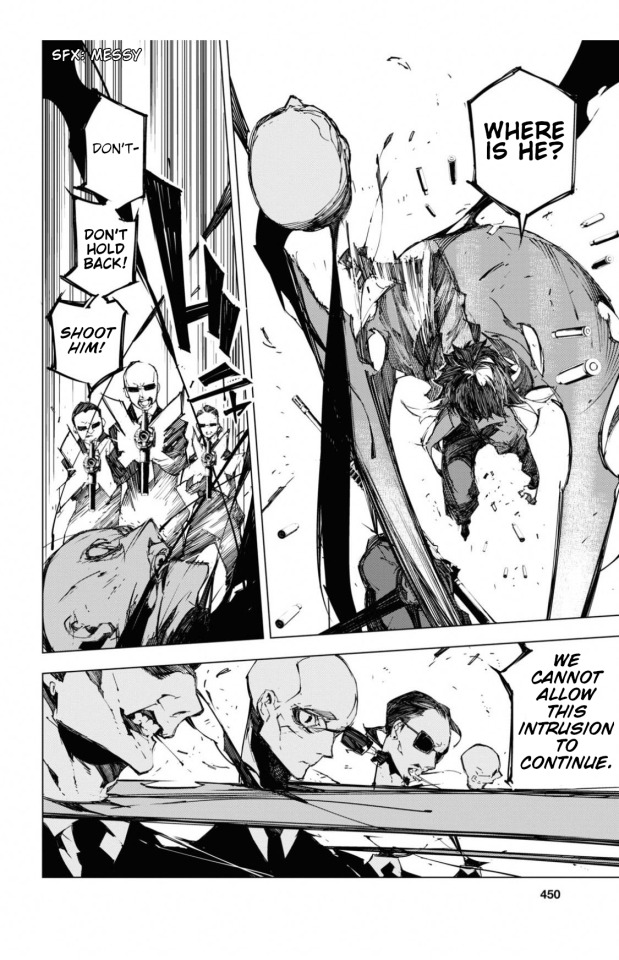
BSD BEAST Chapter 10 - Plan
Part 1 | Part 2 | Part 3 | Part 4
-
Chapter 10 of the beast manga, translated by me and typeset by caffeinatedseri. Enjoy and look forward to other chapters in the near future. (Also worth noting, translating sound effects aren’t really my strong suit so sorry if there are any errors!)
59 notes
·
View notes
Photo
many cute moments of aku here ^^ please enjoy!
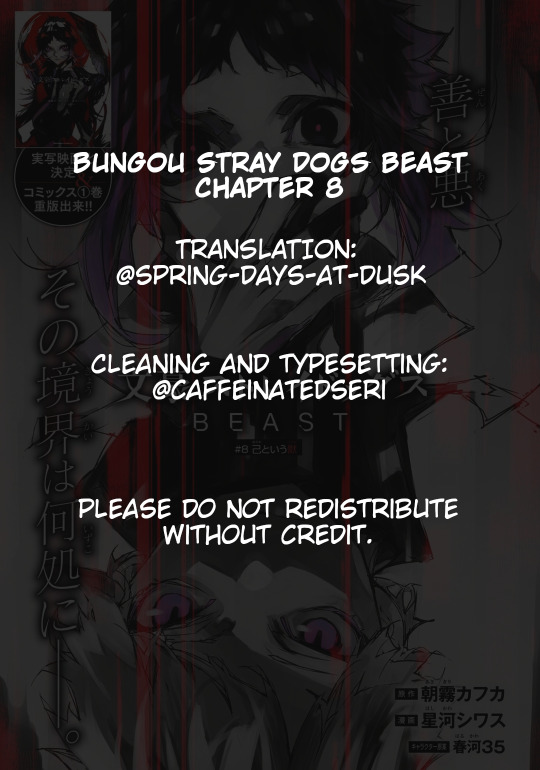

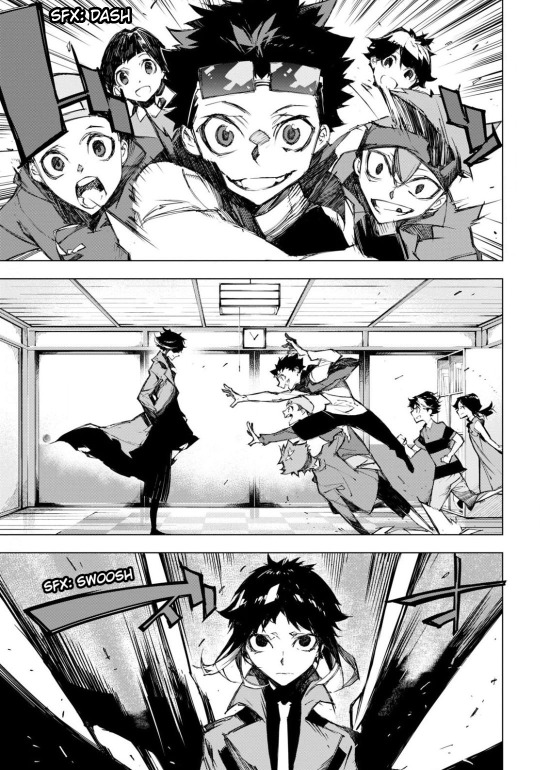


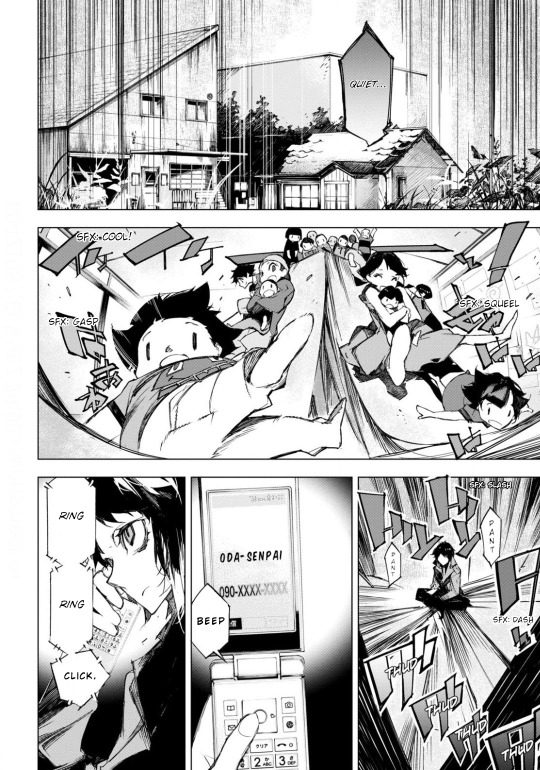

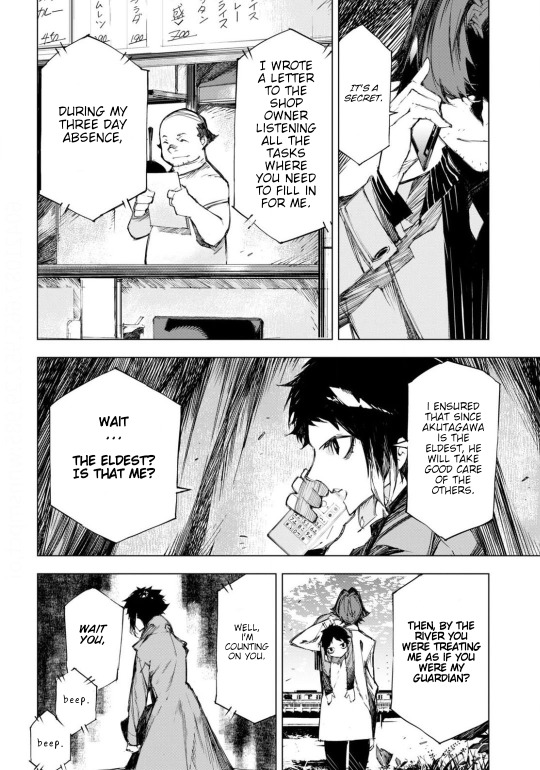
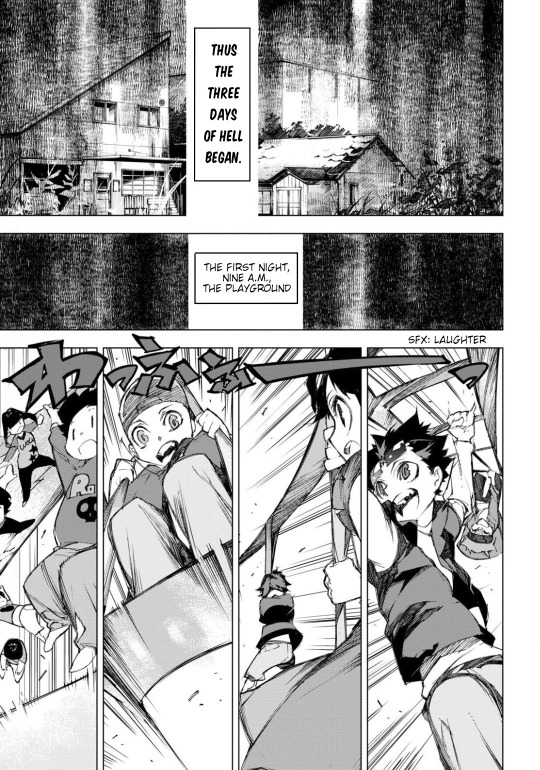

BSD BEAST Chapter 8 - The Beast Called Myself
Part 1 | Part 2 | Part 3 | Part 4
-
And without further ado: here is chapter 8 of the beast manga, translated by me and typeset by caffeinatedseri. I hope you all enjoy! Look forward to the other translated chapters in the near future.
118 notes
·
View notes